Rod Dreher's Blog, page 43
November 4, 2021
Republicans Vs. The Baizuocracy
A conservative reader writes to say that he is agnostic on whether or not the GOP victories this week are meaningful. I have edited this somewhat for clarity and concision:
The Left has won all the cultural fights because the backlash against progressive lunacy usually amounts to nothing more than voting Republican, and then letting a grifter class within the GOP run the government to satisfy the donor class. Think about how serious libertarians and hardcore neocons are only a small minority of the conservative coalition, but are heavily represented among the party’s elites. They get to decide who gets what.
You talk about “apocalypse” in the sense of “unveiling.” Well, one of the great unveilings of recent years for conservatives has been the mass defection of the consultant class Republicans to things like The Bulwark and the Lincoln Project, where not only their contempt for Trump is clear, but also for the ideological positions they used to claim to uphold. They have always thought of social and religious conservatives as rubes who can be manipulated as electoral cannon fodder. Conservatives might have won big this week, but unless they can understand and put into effect the truth that personnel is policy, then they are going to watch the Left end up winning in the long run.
Keep in mind that the educated young whites who aspire to being part of the ruling class elite in our society are still fully behind wokeness. The further away from the ruling class you are, the more freedom you have to hold “forbidden” opinions — but you also cut yourself out of power. The people who want to hold power and guarantee that it will be held only by them are more than willing to cut everybody else out. They claim to be doing it to help the oppressed, but they don’t give a damn about changing the economic situation in ways that stand to help, say, poor black people, in material ways. Who is going to be hurt the most economically by vaccine mandates and firing those who refuse to comply? Working-class black people.
He adds:
One more thing: you compared DEI officers in the military to Soviet commissars. That’s not quite it. The Soviets installed commissars into Red Army units because they wanted to make sure that officers and soldiers were loyal to the regime. These DEI officers don’t care about whether or not the troops are loyal to America. They are focused entirely on hunting down and casting out bigots, haters, and any enlisted personnel who hold to conservative beliefs. The more accurate analogy is the Red Guards of China’s Cultural Revolution. They were fanatically inspired by Mao, but clashed with the People’s Liberation Army, and had to be suppressed by them.
I have such interesting readers.
He’s right: if the political victories are going to mean anything, the winners are going to have to hit the woke within the baizuocracy — my term for the woke ruling class apparatchiks, based on the Chinese insult for “white leftists” — very hard in terms of policy and legislation. The time for words alone is long over. But there is also a role for the bully pulpit here. Youngkin’s victory shows that Republicans can run against wokeness — specifically Critical Race Theory — get smeared falsely as racist by the media, and still win. They can still win because for now in America, there remain enough voters of all races who still believe in basic color-blind fairness as an American political virtue. One of them is a black woman, Winsome Sears, who was just elected Virginia’s lieutenant governor. My sense is that Republican elites have been silent on this garbage for so long because they dwell in social circles where fear of being called a bigot is greatest. Maybe, just maybe, Tuesday’s results struck a blow against that groundless fear.
The liberal media and all elements of the baizuocracy are going to call us bigots no matter what — and we can still win power by appealing to the common sense and common decency of the American people. Might as well use that power to push back as hard against the baizuocracy as it has pushed against us. And that includes purging the baizuocracy from Republican ranks. If the baizuocracy, especially in its corporate branch, imposes a social credit system, it will be too late to fight them. We may be facing our last chance to use politics to stop them. Politics will not be sufficient — it won’t even be close to sufficient — but it is necessary.
The post Republicans Vs. The Baizuocracy appeared first on The American Conservative.
November 3, 2021
Revenge Of The Normals
I can’t remember the last time I felt optimistic about politics. What a day!
I think the meaning of yesterday is that normal people are sick of progressive bullying, and took revenge. Look:
The highly educated chattering class has indulged in so much sneering and smearing of parents who can’t define critical race theory but sense their kids are imbibing something that makes them uncomfortable. This isn’t about politics or race or even culture wars. It’s about class. https://t.co/pcd0XbRFto
— Batya Ungar-Sargon (@bungarsargon) November 3, 2021
Let’s be careful not to overinterpret this. Remember that despite the mendacity and flat-out racism of the McAuliffe campaign, Youngkin only barely beat him. There are still plenty of voters satisfied with the Democratic Party’s direction. And, it’s one thing to win an election, but another to actually do something meaningful about the problems that you were elected to solve. Is Gov. Youngkin, a wealthy Mitt Romney-style Republican, willing and able to go hard against progressive racism in the schools, and other manifestations of wokeness? We will see. He is a rich suburban Republican who is going to have to be a traitor to his class to get this stuff done. Godspeed to him.
That said … what a night! It is delicious to watch and read all the media leftists squawking and screaming about RACISM having won. They all live in such airtight bubbles that they can’t see how alienating their radicalism is to normal Americans. It turns out a lot of voters don’t appreciate their kids being propagandized with progressive race hatred and gender insanity. Batya Ungar-Sargon is right: this is class warfare, though it manifests as culture war.
At last night’s conclusion of the National Conservatism conference, Ohio Senate candidate J.D. Vance gave a rousing speech on the theme that universities are the enemy. Not too long ago, I would have thought that was a crazy idea. The past four years, and the mainstreaming of once-fringe academic theories, changed my mind. In his 1953 book The Captive Mind, Polish anti-communist dissident Czeslaw Milosz warned that people should pay attention to seemingly obscure intellectual debates. The people of Eastern Europe, he said, woke up one morning to find that those once-fringe ideas were ruling their lives, having come to power via Soviet military might. In the same way, wokeness, a softer form of totalitarianism, is doing the same thing to us — even as people like Terry McAuliffe and his media allies deny it.
Before J.D. spoke last night, I reconnected with an old friend who is a tenured professor at a major American university. He used to be happy there. Now he is thinking hard about his escape. What happened? Radical activists on faculty and staff have de facto seized control of the university. I can’t tell you precisely what he said they’re doing, because I don’t want to risk outing him. But trust me, it is straight-up Soviet stuff designed to drive any dissenters from the hard progressive line out of the university. I hear stories like this constantly, but there was something about the audacity of this move, and seeing how badly it has shaken up my friend, that got to me. This was literally a few minutes before J.D. Vance spoke — and it really put his talk in perspective.
(Also, after the event, I met an active duty member of the armed services — I’m deliberately being vague here — who said that units in his branch now have DEI [diversity, equity, and inclusion] officers assigned to them. This is an exact parallel to the political commissars the Soviets assigned to Red Army units, to make sure they were politically reliable. I texted a friend in another branch of the armed services, and he said it’s true for them too — and worse, they are constantly being forced to sit through lectures about things like pronoun use, sexual diversity, etc. It’s killing morale. In one Q&A session at NatCon, someone stood and identified themselves as active-duty military, and said aloud, “What am I even fighting for?” Republican members of the Senate Armed Services Committee, are you listening?)
In his talk, J.D. talked about how American universities are the origin of this poison that is killing our country. Where do you think Critical Race Theory, which is teaching our children to hate themselves and each other on the basis of race, comes from? Where does gender ideology come from? J.D. told me later, “When you realize that progressive politics is cover for elite dispossession of people, it’s really liberating.”
This morning, before I left for the airport, I passed on to another academic friend what the man told me about the ideological purification of his university. The second friend, a prominent professor, told me that the truth is, American academia is a cartel. You can’t exist within it without the tacit approval of all the others. If the professoriat has become radicalized to the point where they will not tolerate anyone who deviates from progressivism, then they corrupt the entire system. That is what is happening now, he said — and the only way around it is to found independent universities that strive to do what universities are supposed to do. There is no viable alternative.
This is going to be the work of a generation, I told him. This is the calling of America’s superrich, who have the money to found new universities. If I were Elon Musk, I would pour my fortune into just such a project, as a gift to America. There are so many professors who want to do real scholarship, and real teaching, but they are being crushed in these corrupt institutions. If we don’t figure out how to build alternative institutions to keep the life of the mind alive through this ideological dark age, the decline of our nation is guaranteed. You cannot have an intellectual elite that’s corrupt without going into decline. Look at Arab Islamic scholarship in the medieval period. The Arabs were the most advanced intellectuals around, but when a certain strand of religious ideology took over the Muslim world, it killed intellectual inquiry. We are living through that now in our civilization, with woke ideology.
We don’t have to accept this! But we do need to understand that we are constantly being gaslighted by the media and leaders of nearly all American institutions. For example:
First we were told “that’s not REALLY CRT”.
Then we were told “CRT is not in the k-12 curriculum”.
Now the ACLU is suing Oklahoma to keep Critical Race Theory in the k-12 classrooms.
Are you paying attention yet? pic.twitter.com/qJl8LqwDju
— Mythinformed MKE (@MythinformedMKE) November 3, 2021
It is great to turf out Democrats to protest their poisoning the well with their crackpot progressive ideas, but again, it won’t mean anything if the Republicans don’t move fast and hard against these people and their institutions. J.D. Vance is right: the universities are the enemy — and so are woke corporations, the media, the woke military, and every other institution that has accepted this evil ideology. As I explained in my NatCon talk, I would not have said things like this just a few years ago, but the evidence is overwhelming now that our country is being torn up and torn down by what these people believe, and what they are doing to us. My talk was about what American conservatives can learn from Viktor Orban’s Hungary. We are not Hungary, of course, but the big lessons we can learn from him are
1) to realize that we are fighting a civilizational war here with woke globalists, and
2) we have to be willing to go hard against these elites, using state power to drive back these ideologues, and
3) we have to give up being satisfied with lib-owning, and elect conservative leaders who have the political skill to use power strategically and systematically to work reform
The Republicans have every reason to look forward to the 2022 election. If they run as defenders of normality, they stand to make serious gains. The Democratic elites can’t separate themselves from the radicals, because they have painted themselves into a corner: if you question any of this, you are a racist, a homophobe, a bigot, and so forth. I imagine James Carville’s head is exploding today. If the Republicans can manage to keep Donald Trump sidelined, 2022 is going to be a big year for them.
Now, though, let’s see these incoming Republican leaders deliver with real change. People are sick of the crime, the ideological insanity, and the inability of the Democratic Party leadership to say no to the radicals. Good. Now, Republicans, get to work.
UPDATE: The Democratic strategist Ruy Teixeira, on the “Fox News Fallacy.” Excerpts:
The Fox News Fallacy is having a dire effect on many Democrats. This is the idea that if Fox News (substitute here the conservative bête noire of your choice if you prefer) criticizes the Democrats for X then there must be absolutely nothing to X and the job of Democrats is to assert that loudly and often. The problem is that an issue is not necessarily completely invalid just because Fox News mentions it. That depends on the issue. If there is something to the issue and persuadable voters have real concerns, you will not allay those concerns by embracing the Fox News Fallacy. In fact, you’ll probably intensify them by giving such voters the impression that Democrats simply don’t care about their concerns and will do nothing to address them. That will undermine the Democrats’ ability to respond to predictable attacks against their candidates in 2022 and raise the likelihood of a midterm debacle.
Crime is a great example of this. Initially dismissed as simply an artifact of the Covid shutdown that was being vastly exaggerated by Fox News and the like for their nefarious purposes, it is now apparent that the spike in violent crime is quite real and that voters are very, very concerned about it. According to recent data from the Democratic-oriented Navigator Research, more Americans overall, including among independents and Hispanics, now believe violent crime is a “major crisis” than believe that about the coronavirus pandemic or any other area of concern. Moreover, majorities of even Democrats now believe violent crime is a major crisis and concerns are sky-high among black voters (70 percent say it’s a major crisis). Similarly, the latest USA Today/Ipsos poll (June 29-July 6) finds crime and gun violence topping the list of issues that worry Americans.
Critical Race Theory is another issue on which Democrats have blinded themselves, says Teixeira, who points out that there really is something to the concern. More:
Democrats who embrace the Fox News Fallacy are inclined to believe there is no real issue here other than voters, whipped up by Fox News, who are simply opposed to teaching students about slavery and the like. That is a mistake and blinds Democrats to a real problem that is emerging.
UPDATE.2: Matt Taibbi:
McAuliffe’s collapse, and the corresponding underdog win by private equity titan Glenn Youngkin, is already being caricatured nationally using the language of 1980s politics. We’re meant to understand that the Loudoun County story — which is too complex to summarize easily but involves furious disputes between local parents and the school board over a variety of issues, including a pair of sexual assaults — was cooked up by Republicans as a cynical dog-whistle campaign.
“The GOP ran a master class on race-based identity politics,” wrote CNN’s Bakari Sellers. “The return of the Lee Atwater playbook. Pretty grim,” is how former Harry Reid chief of staff Adam Jentleson put it. “Hats off to the depraved cynicism and villainy and race baiting. It worked in Virginia,” seethed Wajahat Ali of The Daily Beast. Van Jones last night called Youngkin the “Delta variant of Trumpism.”
Just as McAuliffe had no message apart from trying to tie Youngkin to Trump, these commentators seem helpless to do anything but fall back on a cookie-cutter formula for responding to Republican electoral victories in the Trump era. This drive-by commentary misses the weedsy, multi-layered nature of the Loudoun County mess.
Taibbi gets into the weeds, and explains how people who are reliable Democratic votes were so freaked out by the woke shenanigans that they went for the normie Republican. More:
The significance of Youngkin’s win is that it signals Republican competitiveness in those districts again, something that would have been unthinkable even a year ago. These white-collar, highly educated voters, the kind of people who get their shots, don’t watch wrestling, and send their kids to Harvard and Princeton, are the Democratic Party’s base. It took something pretty weird and intense to drive them to defection, and don’t trust anyone who tries to explain it in a tweet. This one really is a long story, and a wild one at that.
UPDATE.3: The newly elected lieutenant governor of Virginia, y’all!
"Instead of trying to elevate all of our students they want quotas and so that means we're going to sacrifice the Asians for the black kids. Now who's going to benefit from that? That's not living in harmony." – Winsome Sears campaigning against racial preferences in education. pic.twitter.com/amS5BCgI0W
— Zaid Jilani (@ZaidJilani) November 3, 2021
The post Revenge Of The Normals appeared first on The American Conservative.
November 2, 2021
Integralism Redux
I know that some readers of this blog don’t read other things at the TAC website — alas! — so they might miss today’s column by Sohrab Ahmari, in which he addresses the argument that he and I had last week on a TAC podcast. Here’s the heart of Sohrab’s piece:
But as he would likely be the first to admit, Rod is not a systematic thinker. This is a fact that makes it difficult to argue with him once he decides to disagree with a fellow writer—and as readers may have noticed, the latest disagreement has centered on me. There is an ocean of words, flowing into a thousand crisscrossing streams, rivers, rivulets, and tributaries. You try to follow one of these waterways to its logical conclusion but are soon swept by the dramatic surge of another.
Does Rod believe that the wokeness he decries is an outgrowth of classical liberalism? Or is it, rather, a distortion or aberration? Does Rod suspect that “liberalism is dead”? Or is it the best we can do in a “pluralist” society, which presumably means it can be resurrected? If we can return to some gentler stage of liberalism, what would prevent us from ending right back where we are, given that that gentler stage contained the conditions that brought us here?
Should we mourn the passing of an “authentic liberalism” and “liberal principles,” lost to “an aggressive and punitive politics that resembles Bolshevism,” as Rod has written? Or was this Bolshevik tendency lying dormant in old-school liberalism all along, as he also argued? Is the Good “the basis of a postliberal political order,” an order that Rod claims to strive after? Or is the Good so indeterminate that any authoritative assertion of it would be a terrible imposition?
Should American conservatives pursue Viktor Orban-style policies against LGBT ideology in schools, as Rod has recommended? If so, then how does he square that with his recent assertion that only “porny” books should be banned from school libraries (gender ideology can be promoted in non-“porny” books, after all)? Should we aim to forge institutions in truth (“live not by lies!”), or merely to enshrine a right to disagree (i.e., free speech as a high good)?
Yes.
This is all very confusing. The source of the confusion (and attendant anxiety), I suspect, is a refusal to relinquish some fundamental liberal commitments. Rod is prepared to admit this. The trouble is that some of those commitments rest on the deceptions liberal ideology spins about itself and the world. Such as the notion that it’s possible to run a society without moral coercion (whatever the morality). Or that liberals invented procedural norms and rule of law just a few centuries ago, and, therefore, to imagine a world without liberalism necessarily means imagining a lawless barbarism. Or that because there is a range of opinions about the good, it would be a grave crime to authoritatively guide a society (relatedly, that such a decision can be forestalled forever). Or finally that “liberalism” itself is so indeterminate a concept that we can’t draw definite conclusions about it.
It is certainly true that I’m not a systematic thinker, but so what? I dispute that my objection to integralism, and my unwillingness to let go fully of liberalism, is not as confusing as Sohrab says it is. Let me speak as plainly as I can.
I do believe that liberalism is “dead” in the sense that the cultural conditions that made classical liberalism possible for the most part no longer exist. I accept Patrick Deneen’s critique, which says that liberalism has failed because it succeeded so brilliantly in liberating individuals from any unchosen commitments. But I also accept the unsatisfying ending of Deneen’s book Why Liberalism Failed, which says that we can’t really anticipate what is coming next, and prescribes (if memory serves) localist experiments. I don’t know if Patrick still believes that, or if he has been converted to integralism.
My unwillingness to fully surrender liberalism is in large part because we still live in a highly pluralistic and diverse society, one in which social and religious conservatives are a minority, and becoming a despised minority. You can gripe about the flaws of David French’s worldview all day — and mostly I agree with the critique — but French is correct that without the First Amendment to that classically liberal document, the US Constitution, people like Sohrab and me have nowhere to hide from those who would persecute us. Something the woke Left doesn’t understand either is that they are happy to roll over liberal principles like free speech in order to punish the unvirtuous, but should they find themselves in the minority, where would they hide to protect themselves from those who despise them?
I freely admit, and have long admitted, that I stand on uncertain ground here, neither believing that liberalism is sustainable (for MacIntyrean reasons, which is to say that the demise of Christianity has removed a basis for cultural unity), but also seeing that any non-liberal alternative would probably be tyrannical. That’s what we are dealing with now: the emerging tyranny of soft totalitarianism, coming into existence because the Left has abandoned liberalism.
But I tell you, I would rather be on this uncertain ground, trying to figure out a workable compromise that would allow us to live in peace than to sign on to the logically coherent but utterly unworkable and, to my way of thinking, repugnant fantasy of Catholic integralism. If you want a logical system, well, it certainly fills that need. But if you think that the United States of America — a majority Protestant nation that is rapidly de-Christianizing — is open to a revived throne-and-altar Catholicism, you’re deluded. Most American Catholics have never heard of integralism, and wouldn’t accept it if they had. Imagine accepting a system of government that would privilege people like Ted McCarrick! I would be shocked if there’s a single majority-Catholic country in the world that would accept integralism.
Sohrab writes:
Is the Good “the basis of a postliberal political order,” an order that Rod claims to strive after? Or is the Good so indeterminate that any authoritative assertion of it would be a terrible imposition?
It is true that we have to base a postliberal political order on the idea of the Good — but I do not want Catholic integralists in charge of defining the Good, and imposing it on the rest of us. It’s very hard to pin them down on what they actually think, possibly because the System is pristine, until you try to instantiate it. For example, I think the reason they get so upset when people bring up things like the Edgardo Mortara case from the 19th century is because it uses a real-life example of Catholic integralism acting on its idea of the good — namely, that a baptized Catholic child has the right to a Catholic upbringing — and using it to justify a monstrous deed (taking a Jewish child who had been secretly baptized by the Catholic maid away from his parents). Nobody thinks we are going to live in the Papal States again, but the fact that you can’t get today’s integralists to condemn what Pius IX did is because Pius’s seizing the Mortara boy was not an aberration of integralist principles, but a fulfillment of them.
People aren’t wrong to want to know if an American integralism would justify doing things like that — and if not, why not? I am supremely confident that a philosemite like Sohrab would never want to do that to a Jewish family — but what limiting principle would prevent a future integralist regime from doing so? What would integralism mean in power in this century? I doubt they all agree. Integralist godfather Adrian Vermeule has written that the southern US borders should be opened to Catholic migrants, and that the United States should be subsumed within an integralist Catholic empire. Logically consistent with prior integralist principles? Probably so. But something that Americans should desire? Uh, not in a million years. Sohrab appears to be a fan of Viktor Orban’s Hungary, but one thing Orban — a Calvinist — certainly is not is a fan of empire. The core of his political vision is defending Hungarian sovereignty over and against the secularist empire of the European Union.
In the recent NYT story about American intellectuals and Hungary, Sohrab appeared here:
He urged conservatives in a 2019 essay to approach the culture war “with the aim of defeating the enemy and enjoying the spoils in the form of a public square reordered to the common good and ultimately the Highest Good,” a phrase that has enjoyed a long half-life. “I don’t want to turn this into a Catholic country,” Ahmari told me when I met him earlier this year. But he counts himself among those who believe conservatism has failed because it insists that the only kind of tyranny “comes from the public square and therefore what you should do is check government power.”
Well, what is the “common good and ultimately the Highest Good”? For Sohrab, that is defined by the Catholic Church. I don’t understand why he believes the Highest Good is to be found in Catholicism, but at the same time say he doesn’t want to turn America Catholic. The problem he has — and I have too — is that we believe in the Good, but when that concept becomes concrete, we run into problems. The integralists, it seems to me, have no room in their conception of the Good for liberty. It’s all command. I, on the other hand, believe that within limits, people have a right to be wrong.
Sohrab writes:
Should American conservatives pursue Viktor Orban-style policies against LGBT ideology in schools, as Rod has recommended? If so, then how does he square that with his recent assertion that only “porny” books should be banned from school libraries (gender ideology can be promoted in non-“porny” books, after all)? Should we aim to forge institutions in truth (“live not by lies!”), or merely to enshrine a right to disagree (i.e., free speech as a high good)?
Actually, I wouldn’t object to all books about gender ideology being removed from schools. My tweeted line about the “porny” books was a response to a Texas Republican legislator who made a list of over 800 books he thought should be removed from school libraries. This is nuts. We ought to at least be able to agree that books with unambiguously pornographic content, like Gender Queer, should not be in school libraries. We don’t have to return to the Catholic Index (of prohibited books) to accomplish that — and that is something that could actually be accomplished in a pluralistic society. I am not willing to give the Catholic Church the right to determine what can and cannot be read in schools, though — nor is the Catholic Church asking for it.
If, however, a Catholic polity wanted to grant this power to the Church, that should be its right. Ours is not a Catholic polity. If the integralists would like it to be one, then they should get busy evangelizing. The idea that taking over the institutions of government and using them to impose minority principles on an unwilling majority is generally unappealing. It seems to me far more likely to invite resentment of the Church, not acceptance of the Church’s wisdom. Which makes me wonder: are these folks more interested in saving souls, or in exercising power? Is the Christian faith about setting us free from sin, or subjecting us to a modified form of ecclesial rule? Given the way even classically liberal America treated Catholics in the heyday of Protestantism, it is difficult for me to understand why American Catholics would be eager to impose their beliefs on others.
In the end, we can’t get beyond liberalism — though if liberalism really is dead, then Something is going to come our way to replace it. What will that something be? I would hope that the transition to a postliberal society will be as painless and as gradual as possible. One of the reasons I’m here at the National Conservatism conference (as is Sohrab) is because I believe that we on the Right need to come up with a workable, practical program that can appeal to a majority of American voters. I’m not looking to create a Christian utopia in the USA; I would be satisfied with a “good enough” regime that fought for a strong localism, helped family formation, strengthened national sovereignty, defended (yes) liberal principles of individual equality before the law (read: kicked CRT to the curb), strongly defended religious liberty and religious institutions, and opposed wokeness in all its forms. There are many other things I would love for the state to do, but I think that’s a program that a wide variety of people, religious and non-religious, could get behind. It is also a program that can be accomplished within a classically liberal framework — which, at this time, and in this place, is the only thing we have.
I missed the event last night in which Sohrab and Yoram Hazony squared off on stage with gay conservatives Dave Rubin and Douglas Murray. I heard that Murray posed an interesting question. I hesitate to say precisely what it was, because I didn’t hear it myself, but it was something to do with the difficulty of reconciling religious conservatism with a social order that is not oppressive to gay people. This is a hugely important question, because even though gays and lesbians are a small minority, their cause is widely supported, especially among the young. We are going to have to find a modus vivendi. There are gay conservatives who value religion, even if they are not religious themselves, and who do not go along with the progressive crusade to stamp out religious conservatism. We religious conservatives need to see if there is some way to make common cause with those gay and lesbian conservatives. It is not the case that Western societies are going to return anytime soon to the point where gays are back in the closet. Woke Capitalism and other woke institutions are doing their dead-level best to make sure religious conservatives have to live in the closet. I believe there are gay men and women of good faith who don’t want religious conservatives to have to live that way. Despite my own Orthodox Christian conservatism on gay issues, I am eager to see if a compromise is possible.
Again, I am not willing to make the perfect the enemy of the good enough.
It is also the case that I have a weakness: I like people, and am inclined to respect them, even if I think they’re wrong. I sometimes fail to live up to that standard, but I try. I was talking with a friend here over lunch about the blows life has given us (since I saw her last, she suffered a serious illness). She brought up something Rabbi Heschel once said: “When I was young, I admired those who are clever; now that I am old, I admire those who are kind.” My friend and I reflected on how that’s hard-won wisdom. You don’t get to middle age without life beating you up. Having been kicked hard by a few things over the last couple of decades, I want to find a way to defend what I believe to be true and important, but without being disdainful of others, and unconcerned about their own struggles.
It is true that we cannot live in a world where everybody can have his way. Sohrab is right: at some point, coercion is unavoidable. Perhaps the best thing about liberalism is that it makes persuasion an ideal. This is not one I want to let go of so quickly. We are living through the coercive Left ramrodding its ideology through, with no regard to how this affects others — because, having decided that dissenters are wicked, the Left absolves itself from having to treat them with respect. One big reason the integralists give me the hives is because the ones most prominent in our public life seem to take pleasure in treating their interlocutors with contempt. Since I wrote about the integralists the other day, I have been hearing from Catholic conservative academics — people whose names you would know — who tell me that they don’t agree with the integralists, but won’t speak out because they are afraid of being monstered on social media, and turned into the next David French.
Fear is not the same thing as respect.
Anyway, Sohrab said in his piece that he doesn’t want to continue this back-and-forth. Fair enough. It’s not pleasant. A Catholic public intellectual who knows us both messaged me the other day to say it’s a damn shame that we Christian conservatives are facing down powerful enemies who control the high ground in our culture, and who want to dissolve the nation and the natural family — and we can’t get past intramural squabbling over sectarian concerns. He’s not wrong.
P.S. Just before I was set to publish, I saw an e-mail from Dr. William Tighe, sending me an essay that appears in the right-of-center Catholic website New Oxford Review, in which the writer Will Hoyt calls integralism a form of totalitarianism. I only gave the essay a quick read, because I have to run to another meeting here at the National Conservatism conference. I’m not endorsing or rejecting its argument — I’m simply putting it up because it might be interesting to consider.
The post Integralism Redux appeared first on The American Conservative.
November 1, 2021
The Battle Of Virginia In The Wokeness War
I spent the weekend in the Sacramento area, leading a retreat about The Benedict Option and Live Not By Lies. I heard lots of stories from people talking about what wokeness has done to their workplaces, their universities, their kids’ schools, and so forth. As crazy as you think it is, there is always something even more insane. Several people mentioned to me that they wouldn’t risk going into San Francisco anymore. Too dangerous, with “smash and grab” robberies overwhelming the city, and an idiotic progressive DA allowing criminals to overrun the place. One person at the event told me that her kid’s elementary school held a formal ceremony marking the transition of a female child, now called “Charlie” — and no parents had been warned or consulted. An active-duty military person told me that wokeness forced on everyone by the all-woke officer corps is destroying the military. “It’s not the same force it was even two years ago,” the person said.
On that point, I related the quote to two friends I know who are — how to put this? — close to the military. Both emphatically agreed. One of them, someone with a lot of experience, said that it is a scandal that none of the military brass are being held to account by Congress for losing Afghanistan. His view is that commanders are going all-out for wokeness because they are looking forward to going to work for woke defense contractors and other Woke Capitalists. In California, my military interlocutor bitterly complained that the senior officer class doesn’t care about winning wars, only beating down the enlisted ranks with wokeness. Another source told me that his family is filled with men who served in the armed forces across the generations, but now none of them want their kids going anywhere near the military as it is today.
It was that kind of weekend. There were some Silicon Valley folks there, who assured me that everything I said in Live Not By Lies about surveillance capabilities was true, but outdated. One man said, “Basically, you should assume that privacy anywhere is impossible.” Another techie listening in nodded his head. I said to him, “You’re not surprised by that?”
“Nope,” he said. He went on to say that he is deeply closeted as a Christian in his major Silicon Valley firm (a name you would certainly know), and that one of the most important things to understand about the tech industry is that it is an ideological monoculture. “They all think alike, and they are all totally, 100 percent certain that the way they see the world is correct, and that everybody should agree with them,” he said, adding that they are willing to coerce people into living virtuously (by their standards).
On and on like this it went. Yet it was an encouraging event, because it’s so good to be around people who understand how insane the world has gone. You know that you’re not crazy, that other people — good people, normal people — see it too. But boy, what a corrupt country we have become. Decline is inevitable. We talked a bit about how in the USSR, one was not able to tell the truth about things out of fear. Consequently, things quit working. It’s going to happen here too.
I keep wondering when the backlash is going to come, and hoping that it will. Maybe it will start on Tuesday, in the Virginia governor’s race. Virginia is a blue state, but if Republican Glenn Youngkin beats Terry McAuliffe, it will be because normies — including liberal voters — are sick and tired of the woke crap that the Democrats and their allies keep forcing on people. Look at this:
Loudoun County mother: “My six year old somberly came to me and asked if she was born evil because she was a white person, something she learned in a history lesson at school.”pic.twitter.com/0NJL5YCoHG
— Christopher F. Rufo
(@realchrisrufo) October 29, 2021
How clear does it have to be to you? What needs to happen to make you see how the woke totalitarians are busy destroying this country, and turning its people against each other?
It is getting more and more absurd. Look at this insanity from the pampered puss Colin Kaepernick, who really believes that NFL training camps is the equivalent of slavery. Watch this clip:
Colin Kaepernick is equating playing in the NFL with slavery.
Yes. You read that correctly.
pic.twitter.com/Q996zDnpCK
— TheBlaze (@theblaze) October 30, 2021
And here is the nitwit chief woke commissar Ibram X. Kendi, who is not smart enough to realize that here he denies that systemic racism is a thing:
Um, this is a straightforward assertion that “structural racism” doesn’t exist. pic.twitter.com/p4vxZ5ES2f
— David Freddoso (@freddoso) November 1, 2021
This ought to discredit him permanently, but of course it won’t. As Arendt said in The Origins of Totalitarianism, facts don’t matter to a pre-totalitarian polity.
Every institution the woke control, they poison — and they lie about it. Look:
Virginia education department boosts critical race theory — despite claim by Terry McAuliffe https://t.co/4kLMSeQsHN pic.twitter.com/LkV48VonAf
— New York Post (@nypost) October 30, 2021
It is impossible to overstate how significant it is that the woke totalitarians control institutions. Take a look at this new document from the American Medical Association, advising doctors and health care personnel on how to speak. Excerpt:
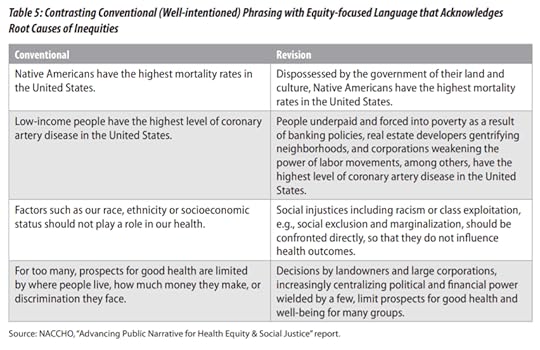
Do you see what’s happening here? They are jamming up plain language with ideological concepts. They are trying to make clear thinking impossible. This is not the Gender Studies department at NYU. This is the American Medical Association! One of the most fundamental concepts to grasp with totalitarianism is that the control of language is vital to the achievement and maintenance of power. The woke totalitarians keep going from strength to strength because having achieved the high ground of institutional authority, they make everyone else fear for their livelihood if they speak out.
The problem is, if we don’t speak out, we will lose our freedom, and we will deserve to. I am hoping that a Youngkin victory tomorrow will be the start of backlash. It won’t be nearly enough, but it would be a sign of hope. If McAuliffe loses a blue state like Virginia, it will be over education, and over parents — including liberal parents — getting sick and tired of the lies, the race-hatred, the manipulation, and the abuse of institutional power to propagandize and indoctrinate the next generation. It will show the way for Republicans to run in 2022 against wokeness.
But — and this is a big “but” — it will do no good if conservatives are given political power by voters and fail to use it to dismantle soft totalitarianism. The Right needs to use the power of government — the only institution we might control — to fight back, and fight back hard. Rhetoric is not enough. Look around you: our military is in decline because of ideologization; our universities have been captured by bigots and fanatics; Big Business is taking advantage of the liberties that our capitalist nation grants them to politicize the culture and institutionalize racism and mediocrity within corporate culture — and so on. We can no longer simply denounce this stuff. We are in a fight for the soul of our nation. To have been with the crowds out in northern California, and to have heard testimonies from flesh-and-blood people about the things they are seeing with their own eyes, and suffering — it all becomes very real then. It’s not just something you read about on the Internet.
Let’s hope and pray that tomorrow’s vote in Virginia will be the beginning of the turning point in this war. We don’t have forever, you know. I’m at the National Conservatism conference in Orlando now, and will be giving a talk in the morning about what American conservatives can learn from Viktor Orban in Hungary. I’ll post that talk here tomorrow after I deliver it.
The post The Battle Of Virginia In The Wokeness War appeared first on The American Conservative.
October 29, 2021
Human Resources As Grand Inquisitor
I thought I was done here for the week, but I just got something from a reader, and it’s powerful. He writes:
I’ll get straight to the point, because I hardly know where to begin. My sister-in-law works for Vail Resorts, which is imposing a vaccine mandate on its employees. Her coworker, whose name I am protecting because I don’t want to jeopardize her job any more than it already is, applied for a religious exemption. The co-worker received this very odd and intrusive reply, a screenshot of which I’ve attached.
 The reader continues:
The reader continues:Questioning someone’s religious sincerity, especially someone you have very little or no personal relationship with, is a delicate matter that should be treated as such, to say the least. This response is clearly in bad faith and is emblematic of a tendency under this vaccine mandate to treat all religious objectors as guilty until proven innocent.
If this precedent is allowed to go unchallenged, imagine how it can be expanded and used for other attacks on religious freedom, with the force of law behind them to coerce a “choice” between compliance and eradication:If you, Christian school, object to hiring this openly homosexual teacher because it violates Christian teaching on sexuality, have you ever or will you ever hire a divorcee or someone who has had premarital or extramarital sex? If you, Hobby Lobby, refuse to fund health care plans that pay for abortions on the grounds that all human life is sacred, have you ever voiced or will you voice equal opposition to the death penalty? The point is not whether or not these are good questions to wrestle with from a moral perspective, and indeed, all believers should. The point is, who the hell is some corporate HR lackey to arbitrate the nature of one’s belief based on the answers? Are they going to drug test this poor woman going forward, to make sure she doesn’t take any over-the-counter medications on penalty of being fired? This disingenuous assault on faith is what is being done to individuals around the country both in the federal government and private businesses; we cannot allow ourselves to be divided by vaccination status in how we respond to this hostile attack on religious belief. First they came for the unvaccinated, but I already had my vaccine, so I didn’t speak out…You tell me: does this line of questioning look like that of an organization fairly and neutrally evaluating religious exemptions, or does it look like they are designed to be traps with which to imply insincerity and hypocrisy, and so deny exemptions? Keep in mind the law solely speaks to sincerity of belief, not logical consistency. Logical consistency in nearly all faith-based systems is almost impossible to prove, and the less familiar one is with the system, the less likely one is to recognize the nuances that allow seeming contradictions to coexist. Again, is this something the government or HR is qualified to assess, especially with these types of questions?We extend accommodations to certain other protected groups with almost no validation of belief whatsoever, despite glaring logical inconsistencies; this is a uniquely religious persecution. Don’t believe me? Identify as a woman and demand access to any role or physical space reserved for that gender, and see if any HR bureaucrat asks whether you’re on hormone treatments and how long you’ve been on them, or if you intend to keep your penis.This is truly alarming, and what so much of our country is tolerating in the name of fear and safety comes as a punch to the gut. What legal recourse is there to this kind of abuse of power? How can we band together?This sneering, condescending letter from the Human Resources department — which, as the reader observes, would never address a transgendered person this way — is an indication of where religious believers stand in America today.Indeed, how can we band together? Thoughts?UPDATE: I blacked out the name of the HR person.UPDATE.2: A reader comments:
I’m struck by the cross-purposes these HR departments are working at. My company, as with many others, are threatening termination to those who wont get the vaccine, even for people who work 100% remote. Yet I am also a manager (IT & analysis stuff) having a hell of a time trying to hire right now since there is so much competition for talent. We are forced to substantially raise offers. Plus we are getting a lot of people poached by other firms. Then all over in the service sector like restaurants and hospitality there are help wanted signs and terrible service because they cant stay staffed up, at least where I live.
So honestly, I feel like if you can financially handle it, call their bluff and let them try to terminate you. The companies are already losing talent like crazy in the “great resignation”. Someone is going to find some clever way to hire unvaccinated despite Biden’s order because frankly there aren’t enough workers to go around (unless the feds really change visa policy)
Seriously, companies really cant afford to lose good people now. The workers have a strong hand, play it! If one of my best people refused the vaccine I would be fighting HR with all my might to get an exception for them. It’s easy for HR to act like this, but actual operational managers aren’t going to be so ideological when someone good is getting axed over something so dumb.
The post Human Resources As Grand Inquisitor appeared first on The American Conservative.
Mircea Eliade On The Meaning Of Temples
(Readers, I didn’t want to end this week on a sour note. Below is an adapted piece from my Substack blog: further thoughts on Mircea Eliade’s great book “The Sacred and the Profane”.)
Eliade says that temples exist symbolically “at the center of the world” because they are where man establishes communication with the transcendent realm. It’s not that man can’t talk to God in other places and in other ways, but the temple is a special place set apart. The temple often represents a sacred mountain where the initial meeting with God happened. For traditional Christians, churches are a representation of Golgotha, and therefore “the pre-eminent ‘link’ between earth and heaven.” Obviously there are countless churches in the world, so understand that they all exist at the center of the world in a symbolic, mythic sense.
This jumped out at me because it is easy to see how the older, sacramental forms of Christianity conform to this global pattern. The death and resurrection of Jesus of Nazareth is the core of the religion, and is re-enacted every time there is a liturgy at the altar. The altar is Golgotha, which is part of Mount Moriah, on which the city of Jerusalem is built. When you take the sacramentality out of the religion, as many forms of Protestantism have, it wrecks the symbolism. How can a church that looks like a theatrical space do the symbolic work it is supposed to do? Does it matter? I think it surely must.
You’ll remember, maybe, the lovely line from an older black lady running the dry cleaners in my hometown, St. Francisville, when my then-priest brought Orthodox liturgical vestments to her for the first time: “Ooooh-weee, those look like they got God all over them!” Yes, exactly! (Father Matthew, from Washington state, was amazed and delighted to go on to discuss the Old Testament in detail with this same woman, who had only a high school education.) Physical space, visual imagery, sounds, smells — these things matter. They aren’t the same thing as God, but they prepare us, consciously and subconsciously, to enter into communion with Him. The fact that traditional religions of all kinds, around the world, build temples that don’t look the same, but which symbolically perform the same function, is anthropologically meaningful, don’t you think?
Let me be clear: it’s not that God is not with people who worship in low-church Protestant temples; it’s that the structures perhaps make it harder for the worshipers to feel God’s presence. This matters for my book project, because I am trying to figure out how we can re-enchant the world, and live more like “religious man” (Eliade’s term) lived in the premodern era. The Protestantization of worship spaces, and the de-sacramentalization of some forms of Christianity, likely contributed to the disenchantment of the world. It wasn’t on purpose — nobody can accuse the Puritans, for example, of wanting to push God out of the world — but their theology, and horror at things that smacked of papistry, might have led them to throw out too much.
(Notice I qualify all these conclusions with “might,” etc., because I don’t want to make firm statements without more research. This newsletter, re: Eliade, is basically a notebook.)
Eliade discusses how for religious man, even his home must be configured religiously, that is to say, to bring it closer to the Center Of The World by making it a place that looks like where God dwells. In Orthodoxy, it is customary for an Orthodox home to have an icon corner, which functions as a kind of home altar. This is where the family gathers to pray. Eliade talks about how the modernist architect Le Corbusier described the home as “a machine to live in,” and goes on to say that the desacralization of the home is part of the greater desacralization of the cosmos by industrial, Enlightenment, scientific thought. He wonders if “this secularization of nature is really final, if no possibility remains for nonreligious man to rediscover the sacred dimension of existence in the world.” My task in this book is to discover what nonreligious man needs to do to rediscover it — and what religious man needs to do both to ground himself more deeply in the religious sense, and to make true religion more inviting to nonreligious man.
We know that a religion that accommodates itself to a desacralized, profane world is not attractive to non-religious people … but at the same time, very many of them don’t want to do what it takes to be authentically religious. This is a challenge for us. Intuitively, it seems to me that we have to make our habitation — not just our houses, but the world we live in — seem more sacred. At the Touchstone conference, a Catholic man from Chicago told me that his parish did a formal procession through a downtown neighborhood, and everybody was staring — not in a hostile way, but in a “what is that?” sense. Most had never seen such a thing, I would wager.
Church historian Robert Louis Wilken, in his great 2004 essay “The Church As Culture,” writes:
If Christian culture is to be renewed, habits are more vital than revivals, rituals more edifying than spiritual highs, the creed more penetrating than theological insight, and the celebration of saints’ days more uplifting than the observance of Mother’s Day. There is great wisdom in the maligned phrase ex opere operato, the effect is in the doing. Intention is like a reed blowing in the wind. It is the doing that counts, and if we do something for God, in the doing God does something for us.
The poet Dana Gioia, the current director of the National Endowment for the Arts, puts it nicely in the poem “Autumn Inaugural”:
There will always be those who reject ceremony,
who claim that resolution requires no fanfare,
those who demand the spirit stay fixed
like a desert saint, fed only on faith,
to worship in no temple but the weather.
Gioia acknowledges the point:
Symbols betray us.
They are always more or less than what
is really meant.
Then:
But shall there be no
processions by torchlight because we are weak?
Praise to the rituals that celebrate change,
old robes worn for new beginnings,
solemn protocol where the mutable soul,
surrounded by ancient experience,
grows young in the imagination’s white dress.
Because it is not the rituals we honor
but our trust in what they signify, these rites
that honor us as witnesses—whether to watch
lovers swear loyalty in a careless world
or a newborn washed with water and oil.
If Christ is culture, let the sidewalks be lit with fire on Easter Eve, let traffic stop for a column of Christians waving palm branches on a spring morning, let streets be blocked off as the faithful gather for a Corpus Christi procession. Then will others know that there is another city in their midst, another commonwealth, one that has its face, like the faces of angels, turned toward the face of God.
Beautifully said!
Eliade writes (emphasis in the original):
In the last analysis, it is by virtue of the temple that the world is resanctified in every part. However impure it may have become, the world is continually purified by the sanctity of sanctuaries.
I believe that the presence of God wherever He is worshipped — a fine Gothic cathedral or a storefront Pentecostal church — resanctifies the world. But churches that look like churches, and are thereby set apart visually from all other buildings, convey to everyone, even nonbelievers, that God is present. Consider these two Lutheran churches in Oslo, Norway:

Which one sanctifies the city? From a purely spiritual point of view, none of us can say. But from a symbolic point of view, the answer is obviously the one on top. It looks like a temple. In fact, Eliade explains that in traditional religious cultures, temples usually have a symbolic opening to the sky, to convey the sense that there is a passage between the building and heaven. The architect of the church on the bottom (and those who hired him to do that work) have lost a sense of the symbolic world and why it matters. It’s not just that the church on the bottom is ugly. It’s that it does not do what a church is supposed to do in terms of directing the thoughts of those inside and outside of it to the sacred. The church on the bottom is a modern church because its architects (and those who hired them) have discarded the grammar of sacred architecture. They’re speaking symbolic gobbledygook.
Winston Churchill once said, “We shape our buildings, and afterwards, our buildings shape us.” Eliade goes on to talk about how traditionally, the church building represents the cosmos. It’s not simply a building in which believers worship. The traditional church “both incarnates and sanctifies the world,” he writes.
“[T]he experience of sacred space makes possible the ‘founding of the world’: where the sacred manifests itself in space, the real unveils itself, the world comes into existence,” Eliade writes. In case you’ve forgotten since the last newsletter, by “the real,” Eliade means the belief of religious man that ultimate reality is part of the unseen realm undergirding all visible reality. By “the founding of the world,” he means giving form and stable meaning to the world in which the religious man dwells.
Eliade (emphases in original):
Every world is the work of the gods, for it was either created directly by the gods or was consecrated, hence cosmicized, by men ritually reactualizing the paradigmatic act of Creation. This is as much as to say that religious man can live only in a sacred world, because it is only in such a world that he participates in being, that he has a real existence. This religious need expresses an unquenchable ontological thirst. Religious man thirsts for being. His terror of the chaos that surrounds his inhabited world corresponds to his terror of nothingness. The unknown space that extends beyond his world — an uncosmicized because unconsecrated space, a mere amorphous extent into which no orientation has yet been projected, and hence in which no structure has yet arisen — for religious man, this profane space represents absolute nonbeing. If, by some evil chance, he strays into it, he feels emptied of his ontic substance, as if he were dissolving in Chaos, and he finally dies.
This passage made me wonder about something. I believe that man is naturally religious. I believe that on both theological and anthropological grounds. We cannot entirely dispel the religious instinct. Wokeness, for example, cannot fully be understood unless you admit its pseudoreligious elements; the craving for a sense of ultimate justice, meaning, and moral structure runs too deep. Wokeness is not a religion, but it mimics one. I am wondering if the disintegration of the West is happening because we have slowly bled out our “ontic substance” as we have grown assimilated into a world built physically, and interiorly, on profane assumptions, and as Christianity has declined both in numbers and in belief.
In simpler language, are we disintegrating as a civilization because we have lost our relationship with God? It has been widely observed that primitive tribes often do not survive their encounter with modernity. If they live on biologically, it is often in a state of chaos, misery, and sometimes substance addiction. The shattering of their cosmos was spiritually unsurvivable. I read not long ago an account of this happening to a traditional Eskimo village, I believe it was. Everybody there just kind of gave up. Even though their lives became materially easier thanks to technology and money, the sudden loss of their traditional way of life was devastating. Maybe we Westerners did not fall apart because it did not come upon us suddenly … but it has eventually caught up with us. Now we live in metaphysical, spiritual, and moral chaos, the seriousness of which is somewhat concealed by our wealth. We cannot reverse the unwinding without recovering the sacred. If we can.
This, by the way, is the view of the French novelist Michel Houellebecq, who is not a religious believer. Yet he believes as a matter of anthropological and sociological truth that human societies must be religious, or they die. Louis Betty is an American scholar of French literature who wrote a very good book on Houellebecq as a pessimistic novelist of post-Christian culture. I interviewed him here. This is what Betty said when I asked him about Houllebecq’s conviction that irreligious societies eventually wind down:
Here it’s important, I think, to distinguish between religion as a human phenomenon and the specific case of Christianity in Europe. I don’t think such a thing as a “society without religion,” in the sense of having a metaphysical framework, really exists; to me, that’s akin to imagining a society without a language, or some notion of kinship, or ways of preparing food. I’m not an anthropologist, but it seems clear that any human society worthy of the adjective “human” is going to articulate some metaphysical system that makes sense of reality and offers consolation and a sense of meaning in the midst of natural vicissitude.
In the case of Christianity in Europe, I think the question to ask is something like this: can a civilization maintain its identity if it sheds its native religion? Houellebecq doesn’t think so, and neither do I. This isn’t a political or polemical point. Imagine taking as an anthropological platitude the claim that human beings will be religious and, moreover, that civilizations are built upon the metaphysical systems they create (or which are revealed to them, to give credit to the metaphysical on its own terms). It’s obvious from such an assumption that the collapse of the metaphysics entails the eventual collapse of everything else. This should be deeply alarming to anyone who cares about the West’s tradition of humanitarianism, which emerges—and it would be wonderful if we could all agree on this—out of the original Judaic notion of imago Dei and later from Christian humanism. Secular humanism has been running for quite some time on the fumes of the Judeo-Christian religious inheritance, but it’s not clear how much longer that can go on.
Honestly, it’s frightening to think what a truly post-Christian West would mean for our basic institutions. I’m not stumping for Christianity here; I just happen to have the intellectual conviction that the analysis of human society begins with religion. If you incline toward Marxian thinking, which looks at things in the diametrically opposed way, you’re going to hate what I’m saying. But that’s how I see it.
In this passage from a 2003 TED talk (21 minutes), the anthropologist and popular writer Wade Davis explains inadvertently Eliade’s point about how for traditional religious man, the world in which we live bears cosmic meaning, and trains us to live by the sacred:
Now, of all the peoples that I’ve ever been with, the most extraordinary are the Kogi of the Sierra Nevada de Santa Marta in northern Colombia. Descendants of the ancient Tairona civilization which once carpeted the Caribbean coastal plain of Colombia, in the wake of the conquest, these people retreated into an isolated volcanic massif that soars above the Caribbean coastal plain. In a bloodstained continent, these people alone were never conquered by the Spanish. To this day, they remain ruled by a ritual priesthood but the training for the priesthood is rather extraordinary. The young acolytes are taken away from their families at the age of three and four, sequestered in a shadowy world of darkness in stone huts at the base of glaciers for 18 years: two nine-year periods deliberately chosen to mimic the nine months of gestation they spend in their natural mother’s womb; now they are metaphorically in the womb of the great mother. And for this entire time, they are inculturated into the values of their society, values that maintain the proposition that their prayers and their prayers alone maintain the cosmic — or we might say the ecological — balance. And at the end of this amazing initiation, one day they’re suddenly taken out and for the first time in their lives, at the age of 18, they see a sunrise. And in that crystal moment of awareness of first light as the Sun begins to bathe the slopes of the stunningly beautiful landscape, suddenly everything they have learned in the abstract is affirmed in stunning glory. And the priest steps back and says, “You see? It’s really as I’ve told you. It is that beautiful. It is yours to protect.” They call themselves the “elder brothers” and they say we, who are the younger brothers, are the ones responsible for destroying the world.
Now, this level of intuition becomes very important. Whenever we think of indigenous people and landscape, we either invoke Rousseau and the old canard of the “noble savage,” which is an idea racist in its simplicity, or alternatively, we invoke Thoreau and say these people are closer to the Earth than we are. Well, indigenous people are neither sentimental nor weakened by nostalgia. There’s not a lot of room for either in the malarial swamps of the Asmat or in the chilling winds of Tibet, but they have, nevertheless, through time and ritual, forged a traditional mystique of the Earth that is based not on the idea of being self-consciously close to it, but on a far subtler intuition: the idea that the Earth itself can only exist because it is breathed into being by human consciousness.
Now, what does that mean? It means that a young kid from the Andes who’s raised to believe that that mountain is an Apu spirit that will direct his or her destiny will be a profoundly different human being and have a different relationship to that resource or that place than a young kid from Montana raised to believe that a mountain is a pile of rock ready to be mined. Whether it’s the abode of a spirit or a pile of ore is irrelevant. What’s interesting is the metaphor that defines the relationship between the individual and the natural world. I was raised in the forests of British Columbia to believe those forests existed to be cut. That made me a different human being than my friends amongst the Kwagiulth who believe that those forests were the abode of Huxwhukw and the Crooked Beak of Heaven and the cannibal spirits that dwelled at the north end of the world, spirits they would have to engage during their Hamatsa initiation.
Obviously I don’t believe in these pagan religions, but I believe that Davis’s account teaches us something about my own religion. If I really believed, as the Orthodox prayer teaches, that God is “everywhere present and fills all things,” I can’t look at the mountain in the same way that the young kid from Montana does, even if the young kid is a Christian. That kid might be a Protestant, or a modern Catholic or modern Orthodox — untrained theologically in their own tradition, and therefore regarding the world through nominalist eyes. Then again, let’s not be unfair to Protestants. It is hard to find an American who treasures the natural world more than Wendell Berry, who is a low-church Protestant. And I don’t think most American Catholics or American Orthodox would think substantially different about the mountain than any Protestant or non-Christian would. We WEIRDoes are all practical nominalists.
What I’m after is the recovery of a vision that sees the world as sacred, really sacred, which means that we cannot make use of it mindlessly, or without limits. To see it as sacred doesn’t mean you can’t use it, but you can’t use it without a sense of reverence. We’ve all heard stories about native hunters who thank the slain deer for giving its life to support the tribe. That’s the kind of reverence I’m talking about. I don’t have much of it myself, but I would like to acquire more. Working on this book is going to be a real journey for me — and for you readers.
—
If you liked this, I publish my subscription-only Substack newsletter two or three times a week. Click here to subscribe: five dollars per month, or fifty dollars per year. The newsletter focuses on religion and spirituality, and the intersection of that with art and culture.)
The post Mircea Eliade On The Meaning Of Temples appeared first on The American Conservative.
Francis Collins: A Cautionary Tale
Oh man, what a powerful essay about Francis Collins by Justin Lee:
On June 8, 2019, Francis Collins finger-picked his guitar and sang Andy Grammer’s song “Don’t Give Up On Me” at the memorial service for a young man who had died after a four-year battle with a rare kidney cancer. The man had enjoyed the song, and Collins, director of the National Institutes of Health, cared dearly for him. He concluded his performance with an emotional benediction, promising that he would see the young man again and that he and his staff would not give up searching for a cure. This is the kind of man Francis Collins is.
One month earlier, Collins’s NIH had approved a research grant requested by University of Pittsburgh scientists who desired to graft the scalps of aborted fetuses onto rats and mice. Their research findings were published by Nature in September 2020 and include photos showing patches of soft, wispy baby hair growing amid coarse rodent fur. This, too, is the kind of man Francis Collins is.
More:
Collins offered an explanation for why he resigned the directorship: He believes “that no single person should serve in the position too long.” One suspects it also has to do with the firestorm of controversies he’s been embroiled in this year. While it may be possible for reasonable people to disagree about the ethics of embryonic stem cell research, some fruits of the Magician’s worldview—such as human-animal chimeras—are, for almost everyone, beyond the pale.
The University of Pittsburgh’s experiment in “humanizing” rodents with fetal tissue harvested from elective abortions was just one of many such projects funded by the NIH. While this particular study was approved for funding by Anthony Fauci’s NIAID, the buck ultimately stops with Collins. Lest one assume out of charity that these grant approvals were made without Collins’s knowledge, in 2019 Collins opposed the Trump administration’s decision to ban NIH intramural research using fetal tissue and to require grants for extramural research with fetal tissue to be reviewed by an ethics advisory board. Last spring, these restrictions were rescinded with Collins’s full support.
In the year prior to the ban, Collins’s NIH spent $115 million on fetal experimentation, a record for the institute. And since 2016, nearly three million dollars have gone toward establishing the Tissue Hub and Collection Site at the University of Pittsburgh, which traffics fetal organs—including organs from viable and full-term fetuses—from abortion clinics to research facilities. Earlier in Collins’s tenure, the NIH funded the research of Pittsburgh’s Dr. Jörg Gerlach, who pioneered a method of harvesting fresh livers from babies delivered alive at 18 to 22 weeks’ gestation, which he has used in both Italy and the United States. As David Daleiden explains, “these babies either died when they were ‘submerged’ in bags for transport, or after their bodies were cut open to harvest their livers.” The University of Pittsburgh’s house of horrors may seem like an outlier, but the callous treatment of human fetuses is also a consequence of federal regulations. As the human-rodent chimera study notes under the sub-heading “Ethical approval,” “The use of de-identified human fetal tissues did not constitute human subjects research as defined under federal regulations” (emphasis mine). In the same section one learns that greater propriety is shown to rats than to the remains of human children. This is the research culture Francis Collins has been immersed in for much of his career, and it’s the culture he reinforced at the NIH. It is the Magician’s worldview enacted—call it the “Magician’s Praxis.”
Read it all. Lee says that even these horrors are not the worst thing Collins has done — and explains why he thinks so.
Lee calls the outspokenly Evangelical Collins “a brother in Christ,” but also says he is “a tragic figure” and “a cautionary tale.” All of this true. How many of us are Francis Collins, compartmentalizing our professional lives from our religious commitments? As others have said, what is the point of having a faithful Christian rise to positions of great authority if they use it to underwrite abominations like this?
The post Francis Collins: A Cautionary Tale appeared first on The American Conservative.
Amanda, Enemy Of The People
The Woke Temple is a Twitter account run by a liberal who hates wokeness. In a post today, he highlighted this monstrous example of Critical Race Theory. Today he writes:
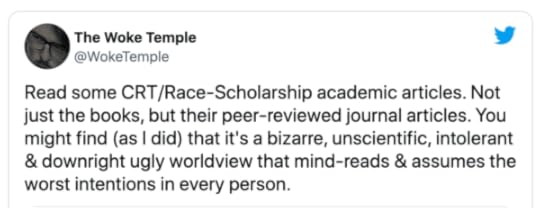
Here’s what he linked to; the original peer-reviewed paper from which this is taken can be read here. One of the authors, of course, is Robin DiAngelo:
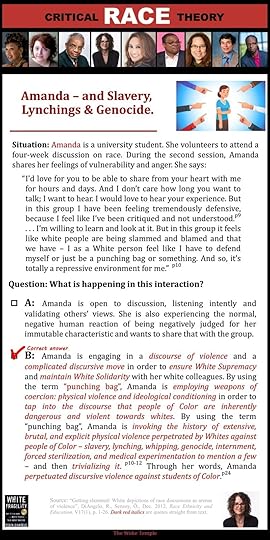
Critical Race Theory is a racist ideology of totalitarianism. Everywhere you see it, oppose it. Our liberty depends on it, as does justice, and the peace of our country.
The post Amanda, Enemy Of The People appeared first on The American Conservative.
Marion Maréchal: Politics Is Downstream From Culture
Good morning from Sacramento, where I’m here to do a couple of days of workshops. A friend sent me this English translation of an interview with the impressive French right-of-center politician Marion Maréchal. Excerpt:
Tyszka-Drozdowski: In an interview with IM—1776 Thierry Baudet said that Trump (and Boris Johnson) made him “very skeptical of our capacity to achieve anything via democratic means.” The late Angelo Codevilla also claimed, for example, that Trump “barked a lot and bit only a little.” What lessons can populists learn from Trump’s presidency and his failures?
Marion Maréchal: Well, the American system is very different from the French system. Nevertheless, there are two things to keep in mind.
First, the power of the deep state, which is particularly strong in the United States, but which is a problem everywhere. When you win an election, you need to have a machine behind you to implement the policies that the voters voted for. Under Sarkozy’s presidency in France, it was a real drama for the Right to achieve this. But when the left wins, they nominate who they want. That’s what Macron did, he changed a lot of the heads of different services and agencies.
The Right is afraid of doing this. When it comes to power, it’s afraid that it will be called ‘fascist’ and so it does what the left wants. So when the Right was in power in France, the administration remained in the hands of the left. This resulted in a political blockade. The government didn’t get the necessary information, it didn’t have the resources to carry out its policies well.
The secondary element is the intellectual centers, media and universities, where the left reigns supreme. The Right will need to make a great effort to create alternatives here through grassroots, social initiatives. Now in France some right-wing voices are appearing in the mainstream media, but they are still insignificant, timid. Above all, I believe that we must not allow our initiatives to depend on the state, to rely on its resources. We must not allow the end of our government to mean the end of us all. This is a big problem, and the reason why I founded the ISSEP [Note: her school for political training — RD].
Change has to be made from the top down, but it will never succeed if we don’t create islands of resistance from below that persist even when the government changes. It is necessary to build islands of resistance in society; it is through them that we will win. I often quote Gramsci, but it was not only Gramsci who said this: political victory comes only after a cultural victory. There are no political victories without cultural victories.
Maréchal speaks here of two of the most important things we US conservatives can learn from Viktor Orban.
First, Orban took control of what you might call the “deep state.” He knew that his government would be sabotaged if he did not.
Second, Orban does not care what his political enemies say about him. Maréchal says that right-wing French politicians are afraid of being called “fascist,” and so hesitate. Here in the US, our conservative politicians are afraid of being called “racist,” or “homophobic,” or some form of “bigot,” and so hesitate. This has to stop.
What she did not mention, perhaps out of tact, is that Trump was a poor practical politician and administrator — something Viktor Orban definitely is not. That is to say, Trump didn’t really know what to do with power when he won it. This is a mistake the populist Right in the US must not make again.
Nevertheless, Trump’s election did change a lot of things for the better on the Right. Yesterday I re-read The Benedict Option to prepare for a talk I’m giving out here. That book was published in March 2017, almost two months after Trump’s inauguration. In it, I was mostly negative about what Trump could accomplish, because (in reading the text) I see that I didn’t trust him to do right by social conservatives, especially on the courts. I was wrong about that, I’m happy to say. But mostly I was right in that book about Trump’s inability to reverse course on the great cultural shifts in the US (though to be fair to Trump, I said that it would be hard for any political figure to do that).
What struck me in re-reading TBO, nearly five years after its publication, is how all the things that sparked me to write the book have accelerated since its publication. If anything, Trump only sped up the process by alarming and consolidating wokeness in power. What this tells us politically is that we on the Right, should we come to power again, have to be aggressive in dismantling wokeness wherever we can. And I think the remarkable surge in the state of Virginia for Republican gubernatorial candidate Glenn Youngkin, who is now leading the polls, shows that fighting wokeness is a popular cause. Ordinary people of all races are sick and tired of what the Left is doing to our schools and our institutions with their insane race and gender ideologies. Leaders of the Right needs the courage to stop giving a damn what is said about them in elite counsels, and go after these cretins hammer and tongs. For example, the next GOP administration should ramp up a Department of Justice task force to use existing civil rights laws to investigate and file suit against exemplary universities for creating hostile, racist climates on campus for whites, Asians, and others.
For example, this insane, racist video has been making the rounds this week:
Rutgers professor: “White people are committed to being villains,” “We gotta take these MF’ers out.”
This professor spewed hatred on a YouTube video with @TheRoot. pic.twitter.com/QrGsv77CCC
— MRCTV (@mrctv) October 26, 2021
What kind of situation do white students who take her class have to deal with? Why should they have to be afraid that their racist Rutgers professor is biased against them because they are white? Neither Rutgers — a state university, mind you, supported by taxpayer funds — nor anybody else would put up with this lunatic for one second if she were white and said these things about non-white people. But it’s so common today that we just accept it and move on. We need a governments at both the state and the federal levels willing to open civil rights investigations against the most egregious cases. Hold these people and the institutions that coddle them responsible. Make them accountable for what they say and do. Viktor Orban used his authority to defund and remove accreditation from gender studies courses in Hungary, because, I imagine, he recognized how the malignant ideology that the produce is tearing the US and the UK apart. For example, just this week, philosophy professor Kathleen Stock resigned at the University of Sussex after being the victim of sustained and vicious attacks by transgender critics and their mindless allies. Amazingly enough, Viktor Orban wants to do what he can within the limits of his powers to prevent this from coming to Hungary:
We deserve to be invaded at this point pic.twitter.com/QO5L7sQoRZ
— Libs of Tik Tok (@libsoftiktok) October 27, 2021
Anyway, the next conservative administration should come in prepared to attack wokeness comprehensively and effectively. In the past, I would have been extremely reticent for the federal government to involve itself in the life of the university. No more. This has to be stopped.
That said, the struggle against the soft totalitarianism of wokeness is going to be a long one. Yesterday the NYT ran a piece on how Millennial bosses are afraid of their Gen Z employees. Excerpt:
Ms. Rodriguez is one of many managers who recalled her Gen Z employees being the first and most vocal in urging companies to demonstrate their support for the protests after George Floyd’s killing. Tero Isokauppila, 37, president of a food business, heard from junior staff asking if his company would post a black square in solidarity with the movement on Instagram. Elaine Purcell, 34, co-founder of the maternity care start-up Oula, got a Slack message from one of her youngest workers after the shootings at Atlanta-area spas in March asking what the team could do in solidarity with Asian Americans.
To many corporate leaders, this invites a welcome correction after decades when businesses were largely silent on racial inequities both within and outside their offices. But some managers are also struggling to balance the demands of their employees for political engagement with their own sense of what’s appropriate for their brands.
“You talk to older people and they’re like, ‘Dude we sell tomato sauce, we don’t sell politics,’” said Mr. Kennedy, co-founder of Plant People, a certified B corporation. “Then you have younger people being like, ‘These are political tomatoes. This is political tomato sauce.’”
This is political tomato sauce. Yeah, and this is a manifestation of totalitarianism, which is a system in which all aspects of life are politicized. When elites of this generation get into the driver’s seat, these Jacobins are going to drive us off a cliff. This is where the wisdom of Maréchal (quoting Gramsci) comes to the fore: we cannot normally hope for meaningful political victory without cultural dominance first. In the podcast I recorded earlier this week with Sohrab Ahmari, he stood on a position common with the integralists, which is that the law teaches the people. Therefore, according to the theory, pass a law and the people will conform their understanding to it.
I am highly skeptical of that. I told him that his team seems to advocate for the Julian The Apostate Option. Julian was the mid fourth century Caesar who tried to reverse the Christianization of the Empire by suppressing Christianity via edict, and promoting old Roman paganism. The effort did not survive Julian’s death; the cultural forces of change in the Christian direction were too strong. I believe the same thing is happening here. Mind you, history is not fated. God is sovereign, and can do what He wants. We Christians must never stop evangelizing and hoping for a turnaround. Nevertheless, we must also accept that this is rather unlikely, and make plans accordingly. A Polish reader e-mailed yesterday, and sent this tweet:
I sat down in Budapest with Axioma, a newish conservative outlet in Hungary catering to young people. Here’s a taste.
— Sohrab Ahmari (@SohrabAhmari) October 22, 2021
The Polish reader added:
Ahmari claims that he was “informed” that Poland’s recent abortion laws have shifted public opinion in a pro-life direction. “The people went along with it,” he says, or something similar. I’m sure he believes it but unless every opinion poll since the laws were established has been wrong, the *opposite* is true. I don’t have anything against these guys and didn’t want to make a big thing of this on Twitter or it would descend into a fight, but either they are kidding themselves about the scale of the authoritarianism an actual integralist state would demand — or they are ingeniously trying to shift the Overton Window.
I believe this is true. In fact, one of the most striking things about the Poles I’ve met and talked to in my visits there is how, despite their political and religious (Catholic) conservatism, they are very pessimistic about the long term future of the country. In particular, they — and I’m talking about men and women in their twenties here — have been grieved by how the government’s actions on abortion have radicalized so many of their generation. My closest Polish friend, in his twenties, was denounced harshly by many of his friends simply because he is a pro-life Catholic, and they knew it.
In any case, we on the Right have a civilizational battle ahead of us, one that is going to last at least the rest of this century, I think. Politics is part of it, because law sets the framework in which these battles take place. But if we depend only, or even mostly, on law, we will get nowhere. We have to work symphonically with politics to renew culture, and at ground that means renewing religion. This, of course, is where The Benedict Option comes in, and why St. Benedict is such an important model for us. One of the key political goals we have to fight for is passing laws protecting institutions that do the work of cultural and religious formation, especially in the face of woke fanaticism. But then we also have to do that actual work.
Last night here in Sacramento I went to dinner with some folks, and heard a few shocking stories about actual people they know who lost their livelihoods because they got on the wrong side of the woke in the smallest of ways. I won’t give details, out of respect for my hosts’ privacy, but these cases they discussed even shocked me, and I’m hard to shock. In two of the cases, the victims did things that were perfectly normal yesterday, but when they committed the acts that got them cancelled, inadvertently crossed new lines that had appeared overnight. You think it won’t happen to you, and the next thing you know you are jobless, and none of your colleagues will touch you because they are afraid that the mob will come for them.
In his latest column, David Brooks writes:
Modern progressivism is in danger of becoming dominated by a relatively small group of people who went to the same colleges, live in the same neighborhoods and have trouble seeing beyond their subculture’s point of view.
If you want a simple way to see the gap between this subculture and the rest of the country, look at Rotten Tomatoes. People who write critically about movies and shows often have different tastes than the audiences around them, especially when politics is involved.
“Hillbilly Elegy” was a movie in which the hero was widely known, in real life, to be a Republican. Audiences liked the movie fine. It has an 83 percent positive audience score on Rotten Tomatoes. Culture writers frequently loathed it. It has a 25 percent positive critics’ score. That’s a 58-point gap.
Dave Chappelle recently released a comedy special that took comic potshots at almost everyone. Audiences adored it. It has a 96 percent positive audience score on Rotten Tomatoes (though admittedly it’s unclear how many of the raters actually watched it). A small group of people found it a moral atrocity and the current critic score is 44 percent positive. That’s a 52-point gap.
A more significant example of the subculture gap recently occurred at the Massachusetts Institute of Technology. Seventy-three percent of American adults believe race or ethnicity should not be a factor in college admissions decisions, including 62 percent of Black adults, according to a 2019 Pew survey. And yet Dorian Abbot, a geophysicist, was recently disinvited from giving a lecture at M.I.T. about climate science because he’s publicly defended this majority point of view. In other words, the views of the large majority of Americans are not even utterable within certain academic parts of the progressive subculture.
It’s important to understand that this is not just “modern progressivism” he’s talking about, but the culture of institutional elites in the US. They’re 100 percent down with wokeness — and are destroying their institutions, and poisoning the minds of the young with racial hatred and destructive ideas about gender. The kind of populism that can win elections, I think, is one that in part takes on this destructive insanity with vigor — and doesn’t just rant about it, but promises specific policy goals to dismantle wokeness and its pomps and works, all in the name of old-fashioned American ideals like fairness and equality before the law. Why are so many Republican elites so afraid?
This will not come from the Left; it has to come from the Right. I will support politicians who show the willingness and, like Orban, the capacity to do this. Meanwhile, my focus will remain on building what Marion Maréchal calls building the “islands of resistance from below.” It’s not an either-or, but a both-and. By all means keep voting and keep being active in the public square — but don’t forget that you can rack up wins there, but lose the war if you lose your children to woke culture.
Marion Maréchal is not quite right: there can be political victories without cultural victories — this is what happened to Trump — but without cultural victories, the political victories will be shallow and ephemeral. Political victories can clear away space for cultural activism and renewal, as I think Eric Zemmour will do if he should run for president of France and win. (If Maréchal, who is still young, ever becomes French president, it will be in part because of what Zemmour will have done.) But again, as Viktor Orban has said in the past, politics cannot provide ultimate meaning. Those who believe it can end up banging on about political tomatoes, and making everybody miserable and afraid.
UPDATE: This is the kind of thing conservatives ought to take on using law and policy:
On October 18, 2021, January Littlejohn and her husband filed a lawsuit against the Leon County School Board (LCS) in the Federal District Court for the Northern District of Florida with the help of the Child & Parental Rights Campaign, a non-partisan, non-profit public interest law firm.
The Littlejohns informed Deerlake Middle School in August 2020 of their 13-year-old daughter’s gender confusion, for which she was undergoing counselling. They gave permission for a nickname to be used but for no other kind of social transition.
Over the next month, unbeknown to the Littlejohns, the school proceeded to call their daughter by they/them pronouns, solicit her bathroom preferences, and ask if she preferred to sleep with the boys on an overnight trip.
When the Littlejohns asked for more information from school officials, they were told that “by law” only her daughter could authorize them finding out more or providing their input. The school could give no actual legal verification for their stance, but did provide the documents they developed in secret with their daughter, a “Transgender/Non-Conforming Student Support Plan,” with no notice or input from the Littlejohns. Among many directives was included a note that the Littlejohns were not to be notified at all.
After further inquiries for the legal basis of such actions, school officials gave the Littlejohns a copy of the LCS Lesbian, Gay, Bisexual, Transgender, Gender Nonconforming and Questioning Support Guide, which states the following: “1) parents are not to be informed when their children announce that they identify as transgender; 2) children who express gender confusion are permitted to choose which restroom they will use and that parents will not be notified of such decisions by their own children; and 3) children have a legally protected right to keep from their parents information regarding their gender identity and steps taken by the district to affirm that identity.”
The Littlejohns, and every parent, needs to know that the state is on their side, and not on the side of the woke institutions that want to seize their children and destroy the kids’ minds and bodies. This should not be hard, Republican Party.
The post Marion Maréchal: Politics Is Downstream From Culture appeared first on The American Conservative.
October 27, 2021
What Do Integralists Want?
If you don’t follow the world of right-of-center Christian intellectuals, you might not have heard of the integralists, proponents of a 19th century political theory that, broadly speaking, conceives of a polity based on Catholic authority.
You might have seen them mentioned if you read the New York Times story on Sunday about right-wing American intellectuals and Hungary. There was this passage, centering Harvard law professor Adrian Vermeule, who has become the leader of American integralists:
New approaches were needed. And Vermeule, a recent convert to Catholicism who is considered one of the most limber legal scholars of his generation, was in a position to provide them. Recently, in a spate of articles published in national magazines and small conservative quarterlies, Vermeule has laid out a methodology for halting what he regards as the relentless advance of the liberal “creed.” In place of originalism — a theory espoused by conservative judges which holds that the meaning of the constitution is fixed — Vermeule proposed “common-good constitutionalism”: reading “into the majestic generalities and ambiguities” of the Constitution to create an “illiberal legalism” founded on “substantive moral principles that conduce to the common good.” Vermeule also offered a complementary theory of the administrative state, a topic on which he has written a number of books, that could be used to promote those moral principles. Those occupying positions of power in government administration could have a “great deal of discretion” in steering the ship of bureaucracy. It was a matter of finding a “strategic position” from which to “sear the liberal faith with hot irons.”
Even many of those interested in Vermeule’s ideas consider him extreme; some suspect him of wanting to impose a Catholic monarchy on America. (Vermeule declined to comment for this article.) But scholarship based on Vermeule’s ideas is starting to trickle out, some of it reshaping his concept as “common-good originalism.” Josh Hammer, the opinion editor of Newsweek, has argued that the emphasis on “general welfare” in the preamble to the Constitution, a synonym for the Greco-Roman concept of the “common good,” is a part of America’s heritage that is overshadowed by our focus on individual liberties. Originalism, with its insistence on “one true meaning,” has turned out to be “morally denuded,” Hammer told me. “Is that the end unto itself, or is it something a little greater?” he said. “It’s a viable political concept to care about national cohesion.”
Samuel Goldman, a conservative political theorist who directs the politics and values program at George Washington University, concedes that the historical record supports the view that “many, though not all, of the American founders really did imagine the U.S. as a sort of Christian nation state, in which public institutions would play a significant role in promoting virtue and be committed to specific religious doctrines. It didn’t work out that way, because even at the time, the population was too diverse, the institutions were too precariously balanced to permit it.” He went on to say that what the postliberals are doing seems strange because “it’s a trip back into an intellectual world that no longer exists.”
For Vermuele, promoting “substantive moral principles” might allow the state to intervene in areas like health care, guns and the environment, where “human flourishing” would take priority over trying to divine the 18th-century meanings of terms like “commerce” and “bearing arms.” Abortion would be illegal. But the outcomes of such policies would not always be the expected conservative ones. Vermeule recently argued in favor of a Covid-19 vaccine mandate, on the grounds that the health and safety of the community was necessary for the common good.
Governing for the common good would be the “final rejection” of the neoliberal dogma that “if you leave individuals to seek their own ends, you’ll necessarily build a good society,” Sohrab Ahmari, the former opinion editor of The New York Post, who says he is launching a new media company, told me. Ahmari, a recent convert to Catholicism, is one of Vermeule’s most visible allies and has become practically synonymous with a self-consciously pugilistic right. He urged conservatives in a 2019 essay to approach the culture war “with the aim of defeating the enemy and enjoying the spoils in the form of a public square reordered to the common good and ultimately the Highest Good,” a phrase that has enjoyed a long half-life. “I don’t want to turn this into a Catholic country,” Ahmari told me when I met him earlier this year. But he counts himself among those who believe conservatism has failed because it insists that the only kind of tyranny “comes from the public square and therefore what you should do is check government power.”
The one thing that everyone under the broad category of “postliberalism” agrees on is that we have probably reached the end of the road with classical liberalism. As Deneen observed in his 2018 book, liberalism has beached itself because it succeeded so well in creating a world in which the individual is liberated from anything standing in the way of his individual choice. Turns out you can’t run a society like that. So now what?
What’s more, postliberals generally agree that the claim of liberal neutrality is a false one. Eventually, lines have to be drawn — and liberalism almost always draws them in the same way. The Catholic writer James Kalb wrote an excellent book on this, and talks about it in this 2009 interview. In the piece, he says, “Liberalism is progressive, though, so its demands keep growing. It eventually rejects all traditional ways as illiberal and becomes more and more radical.” Eventually it has to deny all traditions and traditional institutions as oppressive.
Kalb says liberalism isn’t all bad; it simply has to be subordinated to a shared conception of the Good.
Q: You argue that religion can be the unifying force that offers resistance to advanced liberalism, and that the Catholic Church is the spiritual organization most suited to that task. Why do you think so?
Kalb: To resist advanced liberalism you have to propose a definite social outlook based on goods beyond equal freedom and satisfaction.
A conception of transcendent goods won’t stand up without a definite conception of the transcendent, which requires religion. And a religious view won’t stand up in public life unless there’s a definite way to resolve disputes about what it is.
You need the Pope.
Catholics have the Pope, and they also have other advantages like an emphasis on reason and natural law. As a Catholic, I’d add that they have the advantage of truth.
Note well, I don’t know if Kalb is an integralist, but he’s right about the nature of the Good as the basis of a postliberal political order. The problem, though, is that we in the United States are a highly pluralistic nation, in which Catholics are a minority, and the number of Catholics willing to submit their lives to the teaching authority of the Church is very small. Another problem: unlike when Kalb wrote that in 2009, Catholics now have a pope who does things like
The grand problem facing postliberals of the Right is that we can agree that we need to base politics on an authoritative and shared conception of the Good, but we have no realistic idea how to do that in postmodernity. The integralists — at least the ones who have made themselves heard on the fringes of the American Right — have an idea of how to do it … but it’s completely unworkable. Earlier on Wednesday, I recorded a TAC podcast with Sohrab Ahmari, a leading American integralist, in which we explored these ideas. I held off posting this blog entry until after doing the podcast, in hope that I would have some of my questions clarified by it. It was a fine conversation, but I left it as skeptical as I came in.
To be fair, Catholic integralism is an appealing and coherent way of thinking about politics. Here, from The Josias, the leading integralist website, is a short definition of integralism:
Catholic Integralism is a tradition of thought that, rejecting the liberal separation of politics from concern with the end of human life, holds that political rule must order man to his final goal. Since, however, man has both a temporal and an eternal end, integralism holds that there are two powers that rule him: a temporal power and a spiritual power. And since man’s temporal end is subordinated to his eternal end, the temporal power must be subordinated to the spiritual power.
Why is this appealing? Because they’re right that you can’t ultimately separate politics from concern with the ends of human life. Liberalism tries to do this, but it conceals within it a view of the proper end of human life. I’m interested in what integralism has to contribute to the debate, because from what I have seen, at their best, they are good at thinking these things through. As was clear in the conversation with Ahmari (which will be posted later this week), the major weak spot in my position as someone who identifies as postliberal is that I agree that liberalism as we know it has exhausted itself, but I don’t have a suggestion for what should replace it. The integralists certainly do — and their preferred order reminds me of why as flawed as liberalism is, I am not eager to give it up entirely. Let me explain.
Catholic integralism — the idea that the political order should be subordinated to the Catholic Church — is a complete non-starter in America. For that matter, it’s hard to think of a single country in the Christian world where it would stand a chance. Poland is not an integralist state, but it’s probably the place on earth where political Catholicism is the farthest advanced. I’m not a Catholic, but I generally like what the Law & Justice government there is doing. That said, almost all the Poles I’ve talked to, especially young Catholic ones, believe that political Catholicism is a doomed project over time, because so many of the younger postcommunist generation are falling away from the faith. As I’ve said here many times, Poles tell me that within a decade or so, they expect their own country to go the way of Ireland: into a near-total collapse of the Catholic faith. Understand what I’m telling you: these aren’t secularists who want to see this happen; these are serious young Catholics. Father Wlodzimierz Zatorski, a well-respected Benedictine (who died of Covid last year), told me in 2019 that the only long-term hope for the Church in Poland was through establishing strong Benedict Option communities, and re-evangelizing from there.
If political Catholicism is in trouble in Poland, where almost everybody is Catholic, at least nominally, how on earth is it ever going to triumph in the United States, where Catholics (nominal and serious) only number about 20 percent of the population? And of that number, how many of them would be willing to surrender American liberties for a reactionary 19th century ideal establishing the Catholic Church, and making the State subordinate to it? I bet you could fit all of them into Adrian Vermeule’s backyard in Cambridge, Mass.
In any case, the vague definition of integralism on the Josias doesn’t sound threatening. It’s when you start asking what that means in real life that it turns freaky. Normally, intellectual engagement is something to be enjoyed and engaged. There are plenty of non-Catholics who are interested to figure out a workable future under the condition of postliberalism, and would like to talk it all out. Not these cats. See, this is the thing that you must not do — ask what this would mean in real life. It makes our integralists mad. They blow up online, and sneer, act all indignant, and say that you must be one of those David French types for asking. It’s a silly act, but it tells us something important about them. If they thought that their program would be appealing to people, they would be eager to lay it out and try to win converts. They seem to think that they are going to insult and sh*tpost their way to power. They are very, very good at making enemies, especially of the people on the Right who are their natural allies.
But would you want to let any of these folks close to power? Not if you aren’t Catholic — and not if you are a Catholic who doesn’t believe the Papal States under Pius IX were the foothills of the New Jerusalem.
Think I’m kidding? Here’s Adrian Vermeule, their intellectual godfather, in a 2019 post calling for the US to open its southern border to Catholic migrants, as a first step towards dissolving America and creating a globalist Catholic empire. He concludes:
As the superb blog Semiduplex observes, Catholics need to rethink the nation-state. We have come a long way, but we still have far to go — towards the eventual formation of the Empire of Our Lady of Guadalupe, and ultimately the world government required by natural law.
Now, this is mostly a joke, I think. Vermeule, the Yankee archreactionary, is saying that under his ideal plan, migration to America would favor black and brown people, and the poor, who identify as Catholic. He is trolling the libs. But like many integralists, he really does believe that Catholic principles require a world government overseen by the Catholic Church. Good luck selling that to American Protestants. For that matter, good luck selling that to American Catholics. And if he wasn’t joking about opening the southern borders and dissolving the American nation-state, this is important information for us to know.
Vermeule believes, by the way, that Catholics have no choice but to be integralists. In this short presentation at Notre Dame in 2019, he quotes Pope Leo XIII saying that in America, the political order must not be separated from the religious order, the “perfect society” (Vermeule’s words) of the Catholic Church:
Here, from the book Integralism: A Manual of Political Philosophy, by Thomas Crean and Alan Fimister, is what the term “perfect society” means:

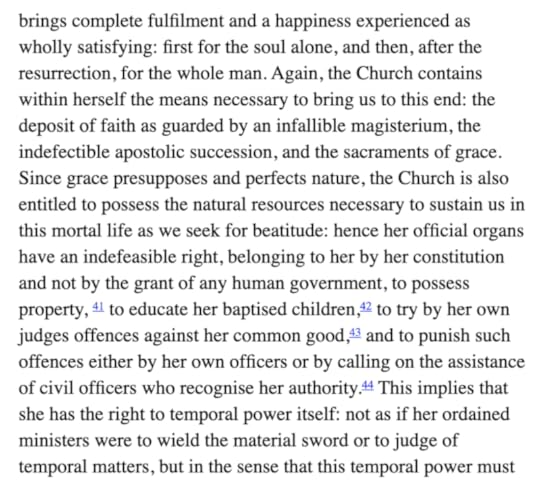
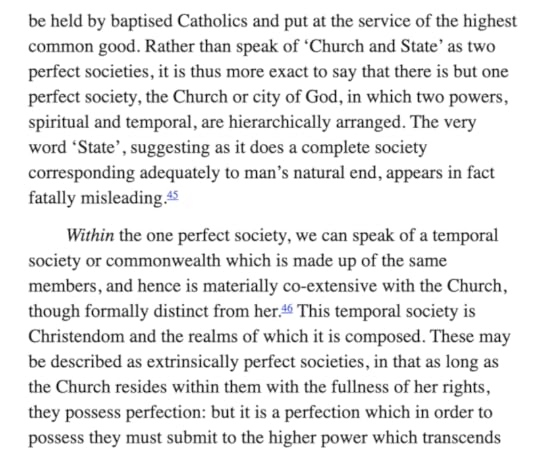
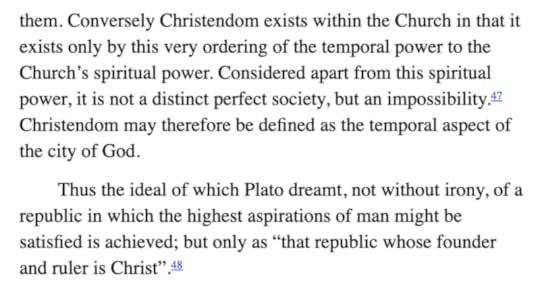
I’ll post more from this illuminating book later.
Vermeule calls papal teaching on integralism “irreformable.” Whether it is or isn’t is not a question for me to take up, but it does indicate how seriously he takes this. At that same conference, Gladden Pappin, an integralist academic and close collaborator of Vermeule’s praised the Chinese Communist regime for having a ministry that clearly lays out what the spiritual goals of a society should be — this, by contrast to the US, which has no such office:
He thinks the US should have such an office, and that it should be the Catholic Church. How do we get to that place in a minority-Catholic country, in which the Catholic Church is hemorrhaging members? They don’t tell us.
Well, actually, Vermeule does tell us. Until such time as they can take over, he told the Notre Dame audience, integralist Catholics ought to march through the governing institutions, with the long-term goal of overturning liberalism:
He is admirably clear about what he’s after. But what role would Jews, Protestants, Orthodox, and non-Catholics have in such a regime?
For these and other answers, turn to the Crean and Fimister book, which is a bit dry but admirably clear in its explanations of integralism. I read it here, for free. Here are some quotes; I’m sorry for the presentation, but I could not copy and paste, according to the format:
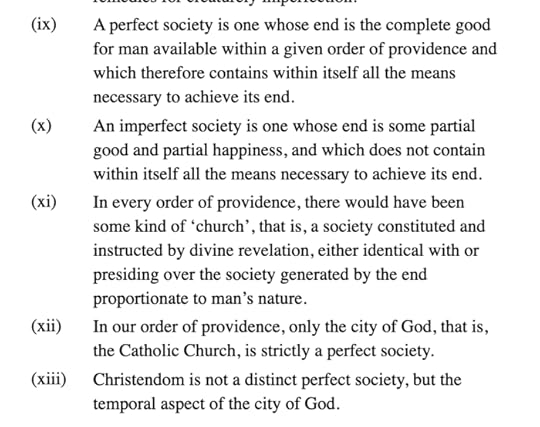
More:

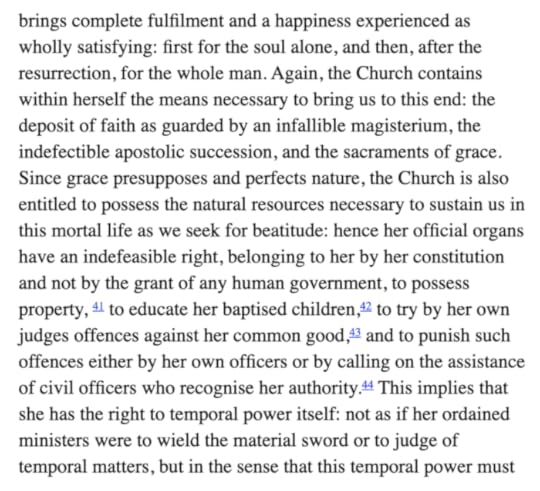
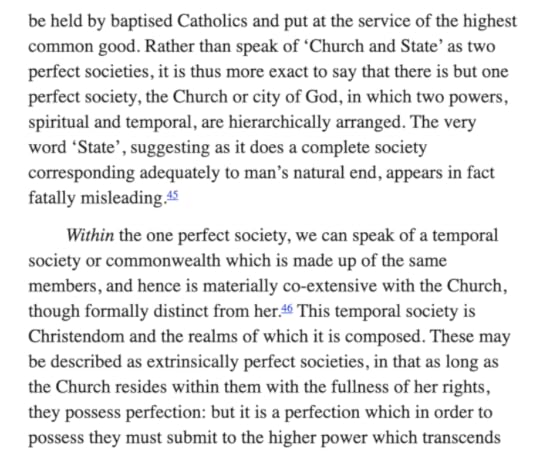
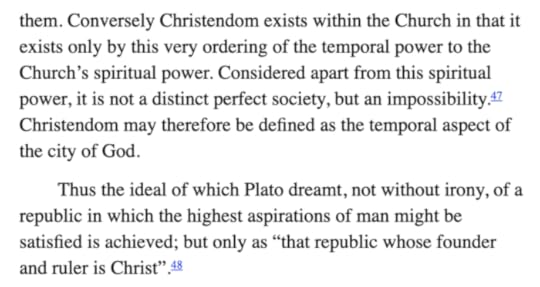
Got that? Integralism teaches that only baptized Catholics may hold political power, and that they must exercise it in accordance with Catholic teaching. Not quite sure how that’s going to work in the United States of America, but let’s go on:
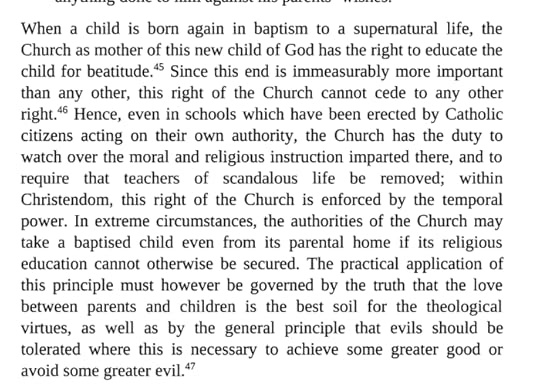
This is a critical point. It is precisely what was at issue in the infamous 19th century case of Edgardo Mortara, a Jewish child who had been secretly baptized by the family’s Catholic housekeeper. As the Mortara family lived in the Papal States, in which the pope was also the temporal ruler, Pius IX dispatched agents to seize the child so he could be raised with the Catholic education to which he was entitled. He ended up becoming a priest, and did not regret his fate — something that is easy to imagine, but in no way obviates or lessens the cruelty of his taking, any more than it lessened the injustice of those pioneer children kidnapped by Indian tribes and raised as Indians, who preferred as adults to remain with the Indians.
When you ask the integralists what they would do to guarantee that the Mortara case wouldn’t happen again if they come to power, they sometimes become indignant, as if raising the issue was rude or irrelevant. It’s not, though. It is rather unlikely that a situation like this would arise again, but it is also extremely important that the Church renounce its “right” to do this monstrous thing. The fact that integralists will not explicitly renounce the Catholic Church’s right to act in this way is a tell. Many conservatives rightly object to the State (e.g., the state of Washington) retaining the right to seize transgender minors from their families so the kids can have sex-change medical treatments. I’m not sure why we would be eager to embrace a system that gives the Catholic Church the right to seize baptized children from their non-Christian parents. I wish the integralists would tell us instead of getting angry at the perfectly reasonable question.
According to integralism, slavery is not ruled out. The slave simply must have his servitude comport with the law:
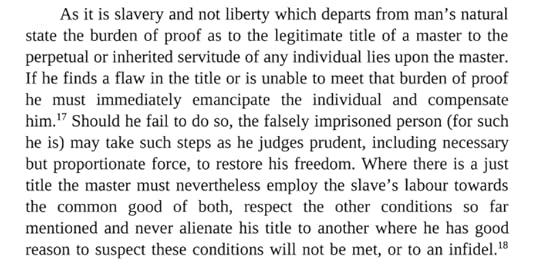
According to integralism, all Christian rulers must be subject to the Roman see:
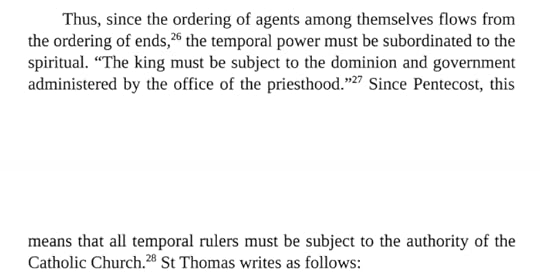
It’s as if the East-West schism and the Reformation had never happened. This is one of those points where you can admire integralism for its audacious logic, but also know that it doesn’t have a snowball’s chance of realization in the world as it actually is.
Here is integralism (insofar as Crean & Fimister represent it accurately) claiming that the ruled have no say over who rules them: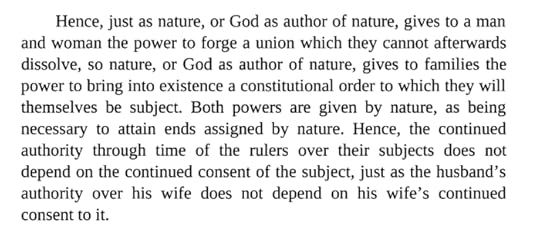
As broken-down and beaten-up as liberalism is, do we really want to trade it for a system that says government does not depend on the consent of the governed? I don’t, and I am confident that only a vanishingly small number of American Catholics would.
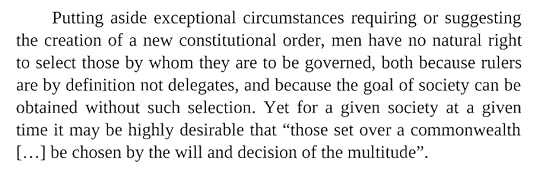
So the people have no right to choose their own leaders, but it might be prudent to let them act as if they did. Got it. As for religious liberty, here’s what the temporal ruler should and should not do:
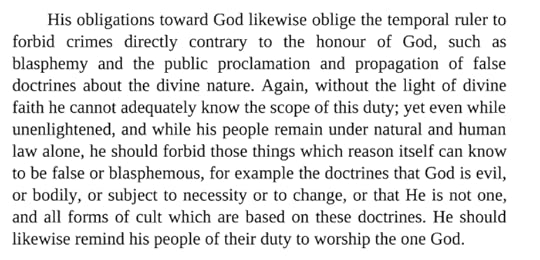
Here’s more:
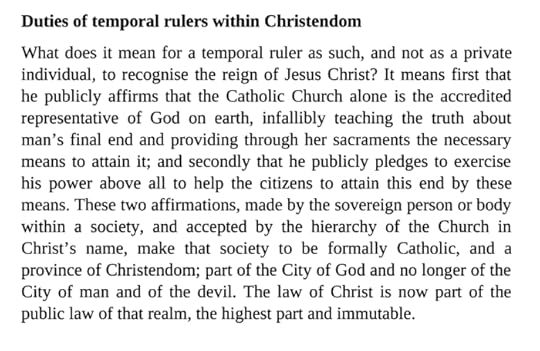
Right. More:
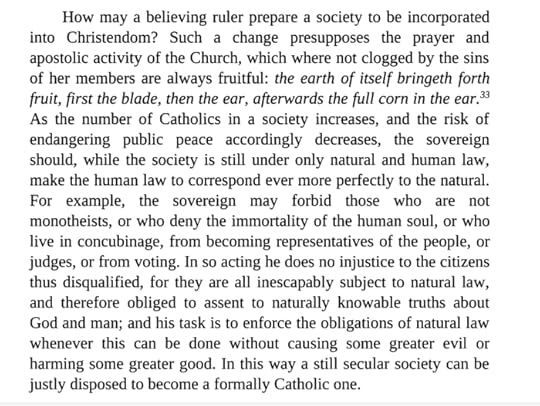
By forbidding those people who aren’t Catholics from voting, the temporal ruler will encourage people to become Catholic. That’s the idea. It doesn’t seem to have occurred to the integralists that this would stir up rebellion by those who do not want to be ordered around by the Catholic Church, or be made second-class citizens in their own country.
So, what kind of role would people like me and other non-Catholics have to play (“Christendom,” in the integralist definition, does not include Orthodox and Protestant countries)? From the Catholic perspective, Orthodox are schismatics — and should have my citizenship suspended until I see reason and return to Catholicism (or, in the case of my youngest child, baptized Orthodox, leaves her baptismal faith and submits to the Pope):
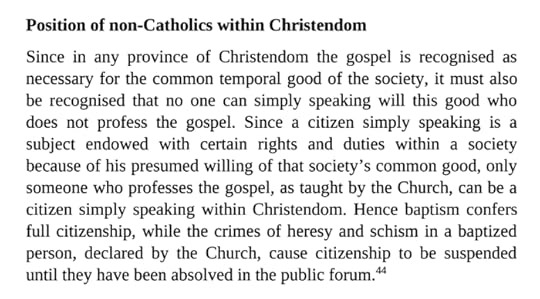
More:
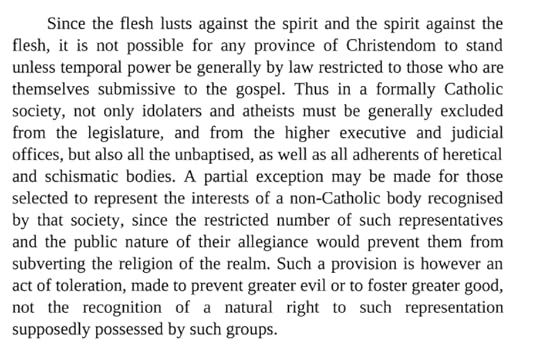
It’s not like they won’t give unbaptized people anything. The temporal ruler owes them nothing, but he might give them “certain civil rights,” though certainly they cannot be citizens, even if they were born in that country:
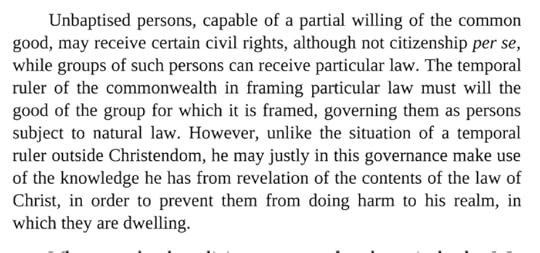
Jews, though, do get a free pass to worship, but they had better not seek converts:
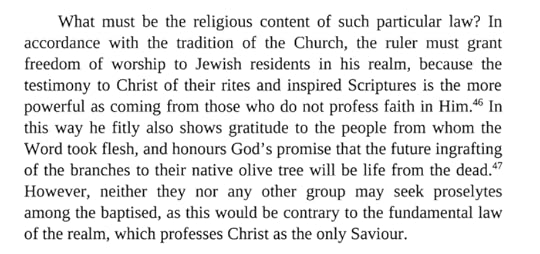
This is from a summary of that particular chapter:
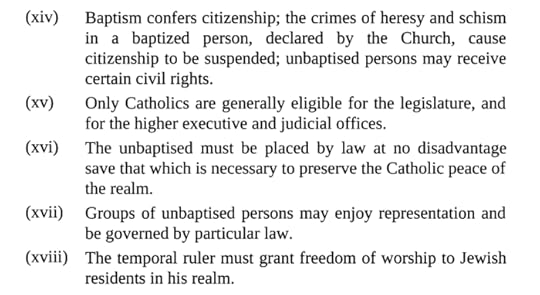
What about Muslims? Mormons? Buddhists? Are they entitled to freedom of worship? Doesn’t seem so. I don’t want to live in a polity where these people, despite their theological errors, are not granted freedom to worship.
Anyway, I encourage you to read the entire book. It makes it very clear why integralists like to keep their discussions of what they believe at a very general level, using inoffensive terms like “political Catholicism” (Sohrab’s preferred description), “common good conservatism,” and saying that they seek a political order based on helping man achieve the Good. Those things all sound good, but the devil is very much in the details.
Again: I fully concede that the weakness of my position is that I don’t have a clear, concise goal for what kind of political order should replace liberalism (and by “liberalism,” I mean classical liberalism, not simply the philosophy of the Democratic Party). Integralism does offer a clear, concise replacement; so does orthodox Marxism. Neither one, though, would or should be tolerated by people who cherish liberty — their own, or that of others. Any attempt to impose integralism, especially on a polity that is majority non-Catholic, would cause civil war. I had not realized until I read the Crean & Finster book after our podcast taping, that integralism is not interested in the consent of the governed. That being the case, it’s easier to understand why Vermeule believes, or seems to believe based on his Notre Dame remarks, that integralists ought to bide their time and infiltrate the institutions of government, until the moment when … what?
This is the primary weakness of the integralist position: it is utterly unrealistic in a post-Christian world. If the integralists get power, and think they can re-Christianize the lost lands of Christendom by executive action, they will find their sovereigns treading the same paths as Julian the Apostate, and King Canute. Second, I find it impossible to believe that these men are anything but appalled by many of the actions of Pope Francis. But they hold their tongues, perhaps out of respect for the office, but also because it’s very hard to convince people that the political order ought to be subject to the will of the Roman pontiff when the Roman pontiff is a font of confusion and instability.
Having read Crean & Finster, I understand better why so many of the leading integralists treat those who question them with sneering disdain. If most people knew what they really believed, they would run screaming the other way. It’s a lot easier to sh*tpost on Twitter, accuse people who don’t accept the integralist revelation of being David French acolytes, and so forth, all to the hurrahs and attaboys of the Very Online. But here in the real world, Christians and other conservatives who would like to construct a viable alternative to decaying liberalism had better figure out how to do so in a way that can accommodate pluralism. The more I read about integralism, and listen to integralists, and see the way integralists treat those who question them, the more I run smack into a big reason why liberalism arose in the first place: to provide a way for people who disagree on the nature of the Good to live together in relative peace.
The other day, Sohrab posted this tweet, which I include below with my comment:
Are Burkean conservatives and classical liberals gay as geese now, and us non-integralists are too sinful to see it? https://t.co/tThBcjn0iv
— Rod Dreher (@roddreher) October 25, 2021
At the risk of being called a big old homo by the integralists, let me put a word in for a Burkean approach. Here’s something John Michael Greer wrote about Burke:
The foundation of Burkean conservatism is the recognition that human beings aren’t half as smart as they like to think they are. One implication of this recognition is that when human beings insist that the tangled realities of politics and history can be reduced to some set of abstract principles simple enough for the human mind to understand, they’re wrong. Another is that when human beings try to set up a system of government based on abstract principles, rather than allowing it to take shape organically out of historical experience, the results will pretty reliably be disastrous.
What these imply, in turn, is that social change is not necessarily a good thing. It’s always possible that a given change, however well-intentioned, will result in consequences that are worse than the problems that the change is supposed to fix. In fact, if social change is pursued in a sufficiently clueless fashion, the consequences can cascade out of control, plunging a nation into failed-state conditions, handing it over to a tyrant, or having some other equally unwanted result. What’s more, the more firmly the eyes of would-be reformers are fixed on appealing abstractions, and the less attention they pay to the lessons of history, the more catastrophic the outcome will generally be.
That, in Burke’s view, was what went wrong in the French Revolution. His thinking differed sharply from continental European conservatives, in that he saw no reason to object to the right of the French people to change a system of government that was as incompetent as it was despotic. It was, the way they went about it—tearing down the existing system of government root and branch, and replacing it with a shiny new system based on fashionable abstractions—that was problematic. What made that problematic, in turn, was that it simply didn’t work. Instead of establishing an ideal republic of liberty, equality, and fraternity, the wholesale reforms pushed through by the National Assembly plunged France into chaos, handed the nation over to a pack of homicidal fanatics, and then dropped it into the waiting hands of an egomaniacal warlord named Napoleon Bonaparte.
More:
The existing laws and institutions of a society, Burke proposed, grow organically out of that society’s history and experience, and embody a great deal of practical wisdom. They also have one feature that the abstraction-laden fantasies of world-reformers don’t have, which is that they have been proven to work. Any proposed change in laws and institutions thus needs to start by showing, first, that there’s a need for change; second, that the proposed change will solve the problem it claims to solve; and third, that the benefits of the change will outweigh its costs. Far more often than not, when these questions are asked, the best way to redress any problem with the existing order of things turns out to be the option that causes as little disruption as possible, so that what works can keep on working.
That is to say, Burkean conservatism can be summed up simply as the application of the precautionary principle to the political sphere.
The precautionary principle? That’s the common-sense rule that before you do anything, you need to figure out whether it’s going to do more good than harm.
This is not as potent, clean, or logical as the ideology laid out by integralism. But it has the great advantage of not reducing people, in all their messiness, to abstractions. It is true that all societies have an idea of the Good that is reflected in lawmaking. You can’t get away from it. It is also true that liberalism is not neutral, that the hidden hand within liberalism tends to favor some things as goods and not others (for example, it inevitably emancipates the individual from all unchosen obligations). Again, though, what is the alternative? The answer is not clear, and working it out is going to require a great deal of thought and collaboration on the Right, among various factions. James Kalb is right about needing a thick sense of the Good rooted in religion, but given the woebegone state of Christianity (and not just Catholic Christianity) in the West, it is extremely hard to see how we arrive at that necessary place, absent mass conversion of everyone to orthodox, magisterial Catholicism as a precursor to political discussion. That seems rather unlikely, to put it mildly, so we are going to have to figure out how to do this in the ruins of what used to be Christendom. I believe that integralists really do have insights to contribute to this necessary conversation, but the thing they’re best at right now is making enemies on the Right, among people who naturally should be their allies.
Sohrab thinks complaining about this kind of thing is “tone policing,” but I strongly disagree. It matters how you address people who don’t agree with you, especially as a Christian public intellectual. Nobody is going to be mocked, sneered at, or shamed into adopting a reactionary Catholic triumphalist philosophy that turns non-Catholics into second-class citizens who have no say in who their leaders are. Sh*tposting is a good way to build a brand, but not a community that can convince other men and women of goodwill to join up, for the sake of restoring goodness and moral sanity in the real world.
Note to readers: I will be traveling for most of Thursday, and will not be able to approve comments. Please be patient.
UPDATE: A Catholic priest e-mails overnight:
How do we know that there is a ready-to-hand and authentic replacement for a liberal order that has descended into a left-wing ill-liberal order? Wouldn’t the centuries long run up to the descent mean that any authentic vision would find itself to be a small and marginalized minority? Wouldn’t it be historically and sociologically more likely that the strongest opposition would come from a right-wing ill-liberal order that was a type of mirror image of the left-wing?As I used to say in the 80s to orthodox seminarians who longed for the replacement of the liberals with “law and order” conservatives: “I’m too Irish to be for ‘law and order’ — I want to know whose law and whose order.” I called it trading the 70s for the 40s, and declared I wasn’t keen to live under either regime. Thing is, there’s no guarantee we’re going to like what comes next and there may as a matter of fact be no way at this point to avoid whatever it is.I think we should consider that the collapse of the liberal order in the West could prove long and ugly, with little influence coming from right believing folks for many, many years–if not generations.Yes. I am sure I would prefer integralism to whatever we are likely to get if liberal democracy falls. We will likely get Caesarism of either the Left or the Right. I see no reason to believe that the Catholic Church would be part of this. But maybe I’m wrong. When Vladimir Putin took over from the ruins left by Boris Yeltsin and the catastrophe of the 1990s in Russia, he knew that he needed some kind of legitimating authority, so he began to rehabilitate the Orthodox Church in public life. It was a wise thing for him to do, strictly speaking from a political perspective. Should Continental European countries undergo a similar catastrophe, it would make sense for whatever political order emerges from the aftermath to do the same thing with Catholicism.The United States, however, is an historically Protestant nation. My guess is that if a right-wing Caesar emerged, he would look something like Gen. Michael Flynn: a hard nationalist authoritarian with at least a veneer of Christianity. Unlike much of Europe, we simply don’t have the “bones,” so to speak, to support Catholic integralism in this country.To that point:
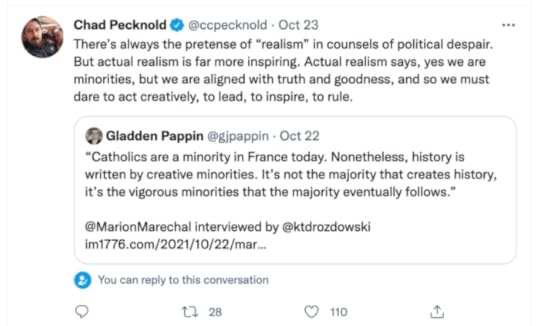 That’s a great interview with Marion Maréchal; I will post on it later, separately. She is terrific, and I hope she becomes the French president one day. I don’t think she is an integralist, but if she were, she would have reason to believe that given France’s historical Catholicism, she would have something to work with in bringing about an integralist order. Still, such a thing would be quite extreme, even in France. How Catholic integralism comes to be in a historically Protestant country like the US is impossible to fathom. It’s an interesting thought experiment, but nothing more. We are far more likely to get a nationalist-conservative government like Hungary’s, a Christian democracy that provides something that a majority can potentially affirm. That’s what I hope for, anyway, not a scheme in which we surrender our liberties to representatives of a Christian religion that only a minority accept.
That’s a great interview with Marion Maréchal; I will post on it later, separately. She is terrific, and I hope she becomes the French president one day. I don’t think she is an integralist, but if she were, she would have reason to believe that given France’s historical Catholicism, she would have something to work with in bringing about an integralist order. Still, such a thing would be quite extreme, even in France. How Catholic integralism comes to be in a historically Protestant country like the US is impossible to fathom. It’s an interesting thought experiment, but nothing more. We are far more likely to get a nationalist-conservative government like Hungary’s, a Christian democracy that provides something that a majority can potentially affirm. That’s what I hope for, anyway, not a scheme in which we surrender our liberties to representatives of a Christian religion that only a minority accept.The post What Do Integralists Want? appeared first on The American Conservative.
Rod Dreher's Blog
- Rod Dreher's profile
- 508 followers



